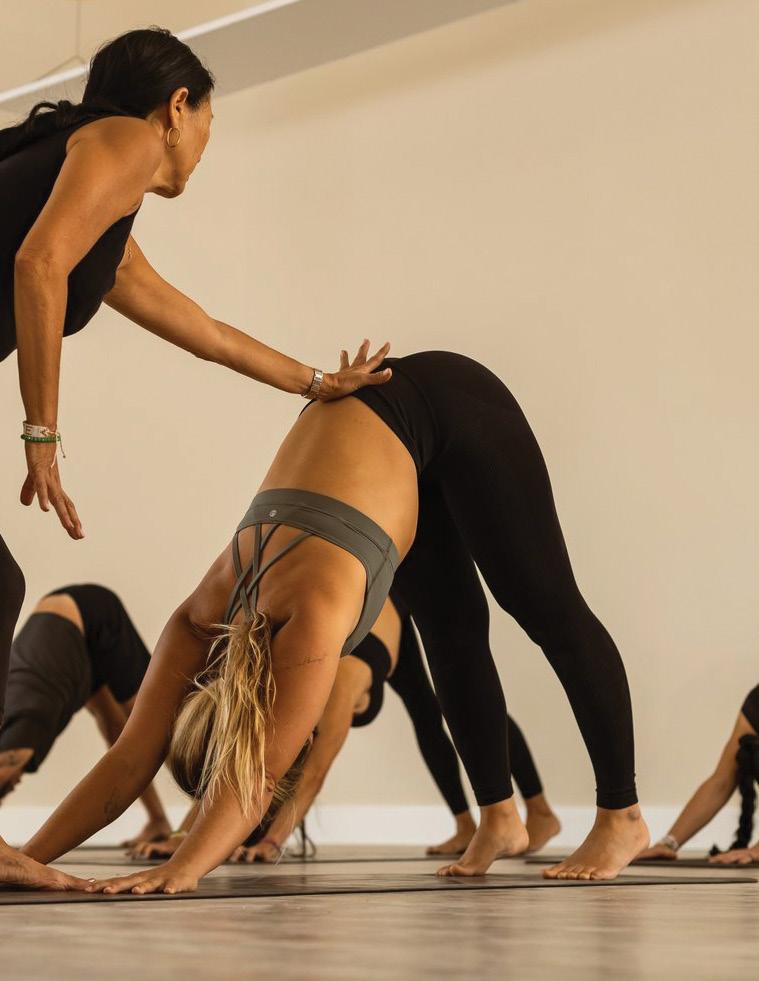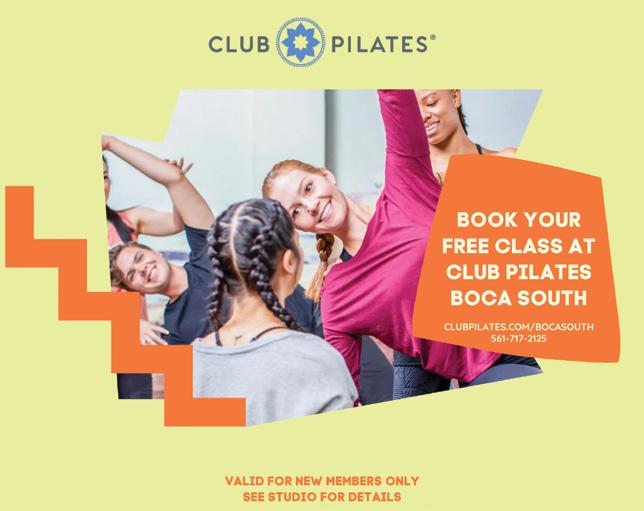




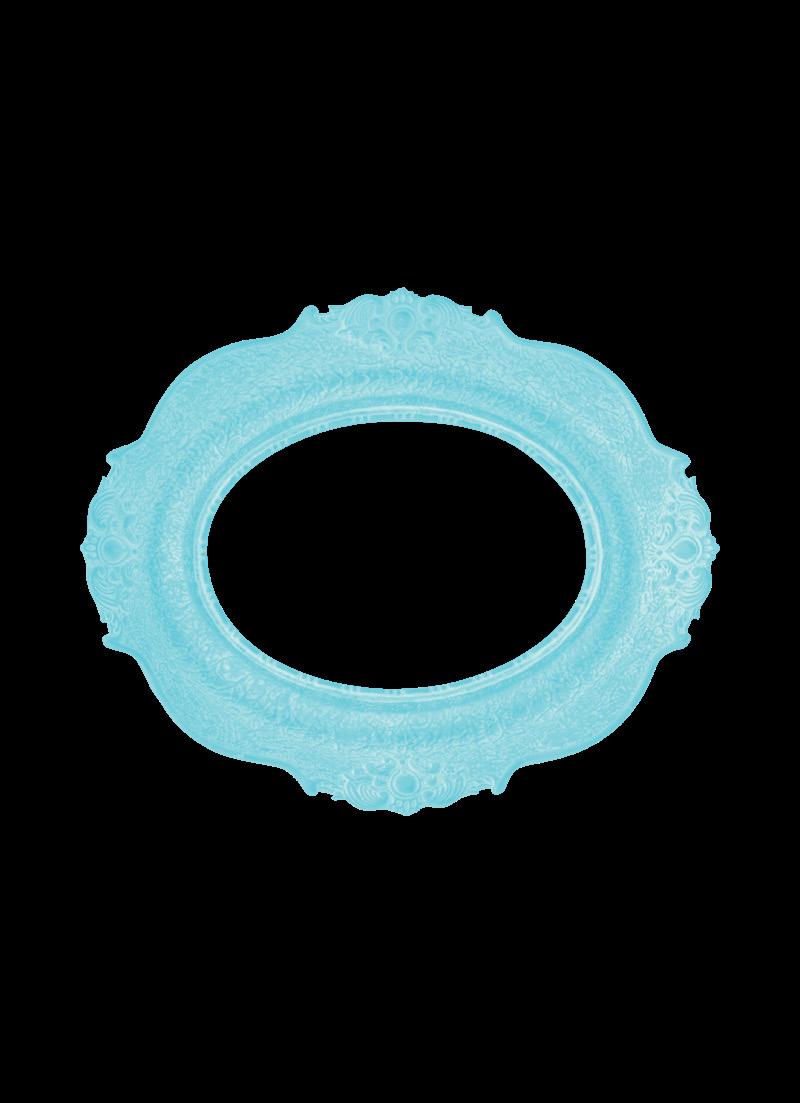
melania zilo editor-in-chief francesca cella creative director sage holaway editor-in-chief assistant
fashion & beauty alyssa chimenti fashion director ella chan, ali tarnowsky assistant fashion directors brandon brownstein, nicole ruiz styling directors lorenzo biondo, ally nelson, ava davison, alexa michel, arianna nettles, gabriela ferreira, aidan rourke, patricia urbonaite, isabella van gaasbeek, sydni torrero, kennedy carbert, chloe smeader stylists sam acello beauty director kallyani prakash key makeup artist art and design serena bruno art director sabrina sylvester, michelle goldman, sergio pimentel, deana dieujuste, melania zilo graphic designers production kimara pretlow production director sara baum, max williams, malena brinson, sage holaway, adriana hurtado, sterling smith photographers charlotte perella, malena brinson, harry mussotte videographers
editorial jolie tanner editorial director bella kubach senior editor maria paula gonzales, ally nelson, jon-david delcastillo, emily fiorini-casamayouret, lili jahromi, matilda pollard, alyssa quarrie, kizzy azcarate, ryan manney, parmis etezady, gael-lynn laguerre content writers
merchandise nicole espinosa merchandise director anjali kamath merchandise assistant digital anika chhabra digital director lorenzo biondo, joe grassi, makayla melendez, alexa belcuore, emma grasso digital assistants
external affairs dazani hodge, kallyani prakash castings assistants hayley aldrich marketing campaign director megan simpson, max williams, janeliz morales, emily panico, fadwiny jean, maya nicholson marketing assistants maya nicholson director of finance


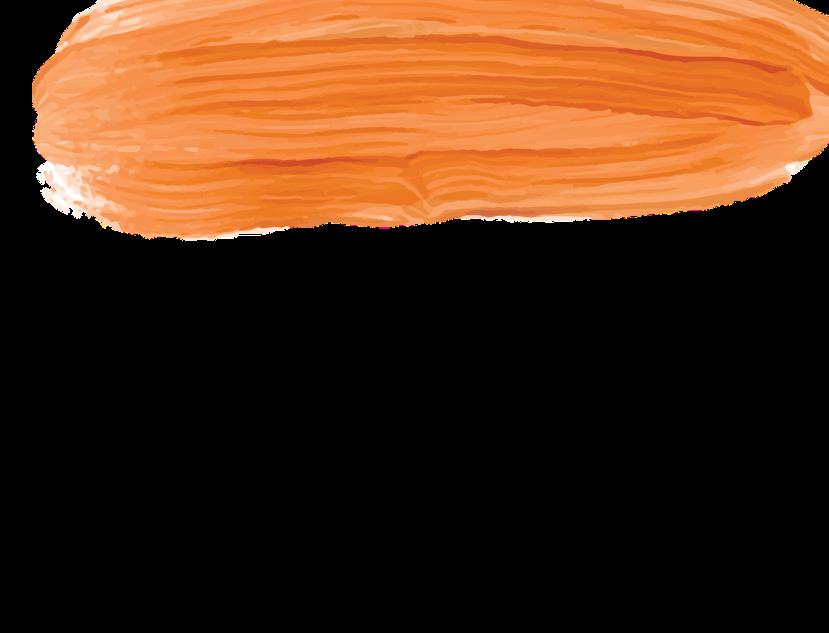
Dude, Is It Just Me? 86 Getting Over Someone You Never Even Dated 96 Therapy, the Hottest New Pastime! 98 SCIENCE + TECH

Did Tiktok Ruin Music for Everyone? 100 Is the Future of Concerts Virtual? 106
Vaping Hits an All Time High 112 People with No Socials Are Cooler 114

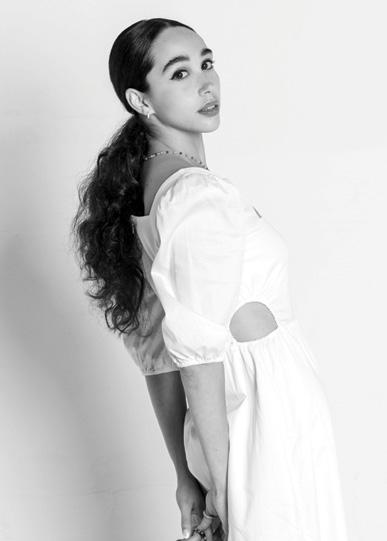
Issue 06 is Sexy, Nasty, Sweet! With each new season comes the feeling of undeniable excitement and the need to keep pushing our creative boundaries and stepping outside our comfort zone. We knew one thing when putting this magazine together: this is not your mother’s Issue!
This edition of Strike is about tapping into your alter ego, finding your power from within, and celebrating individuals in our community who march to the beat of their own bongo drum. Our team had the great pleasure of working with Roujeee Tunes; a Miami-based DJ collective made up of 3 incredibly talented women, Zunji, Miluhska, and Phoenix, who prove that two’s company and three is a disco party. We are proud to have three women who all share a deep passion for community, music, and empowering others through their sound.
This fall, we also had the honor of working with the Borin Brothers, whose sound is the anthem of our generation. Their photoshoot immediately turned into a live concert in our garage, their electrifying energy attracting all of our curious neighbors to come outside and watch the magic unfold (we may have also attracted a noise complaint or two, but that’s rock and roll, baby).
As you hold this Issue in your hands, I want you to know how much hard work, passion, sweat, and tears were put into making it. One thing that young creatives have in common is our hunger to create and show you just what we can do if given a chance. Thank you for another unforgettable season. I am endlessly grateful to be Strike’s Editor-in-Chief and owe it all to my team. I want to thank our Creative Director, Francesca Cella, and Assistant Editor-in-Chief, Sage Holaway, for everything we have been able to accomplish together this season. Making art is no fun unless it’s with the people you love.
Love,
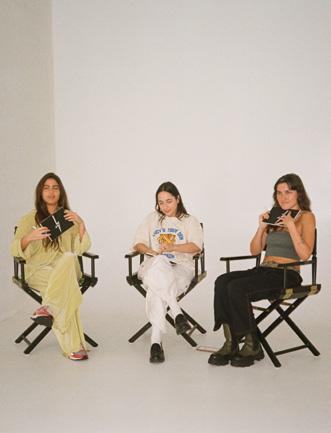 Roujee Tunes on set, shot by Melania Zilo
Roujee Tunes on set, shot by Melania Zilo
It can be confidently said that the internet is divided by your interests and what the internet thinks you might be interested in. If you’re into sports, then several highlight reels of your favorite players get sent your way. If you’re into music, you might get shown people asking strangers what they’re listening to, and if you’re into fashion, you might be watching people discourse on different subcultures. But if you happen to find yourself on the side of the internet that’s been obsessed with Aritzia hauls, 5 am morning routines, slick back bun tutorials, and finding the best places to order matcha lattes, there is a chance you may have heard of Matilda Djerf. This past year, Matilda Djerf and her brand have been the cover girl of the clean girl aesthetic. Every haul trying to maintain this minimalist perfectionist status never fails to mention the former or the latter. The influence that Djerf avenue has is proof that influencer brands, when done right, can not only stand on their own but can hold major influence over style trends and that a brand started by an influencer can stand on its own.
Even though influencing is still a very new industry, it has quickly become a sought-after “profession.” One that has become synonymous with being sent ‘pr’ gifts from brands, getting exclusive products before anyone else, and making a living off of posting your life –the kind of perks from a job anyone would want. Although this uber-lux borderline celebrity treatment and lifestyle is the most highlighted part of being an influencer, it doesn’t come that easy. Even with how glamorous this lifestyle is, work and effort are still needed to maintain this. Making sure your hair and makeup are picture-perfect at any given moment will leave you constantly looking in the mirror, maintaining your youthful glow with botox, filler, and facials with the latest beauty trend, all to look “perfect,” so rent is paid. At first, this trade-off doesn’t sound that terrible; who wouldn’t want their life to just be nonstop pampering and getting
paid to post pictures? But when youth and beauty are your livelihoods, simply getting older and growing as a person limits this limelight. Trying to add more time to these fifteen minutes of fame is a struggle that all influencers go through. Being the same picture-perfect person for years on end to stay relevant so they can make a living isn’t realistic, so what’s an influencer with thousands or millions of followers to do? Start a business –and that’s exactly what Matilda Djerf did.
Before launching her brand, Matilda Djerf already had an established following on Instagram with people that loved her sense of style. So when she founded and launched her brand Djerf Avenue in 2019, she slowly started incorporating it in her posts. In all of her outfits, she can always be seen wearing at least one item from her clothing line, which is always tagged in every post. By wearing and promoting her own brand, she has established a relationship with her audience while also creating a demographic to market to.

However, a common fault that most influencers make when starting their own brands is by having them too closely associated with their influencer status. This might not seem like a problem, but their brand will follow suit when they’re no longer relevant (or canceled). Influencers starting their own brands and having the only special thing about it being that it’s their brand is not a business strategy that will last. It’s in these common faults that Matilda Djerf has made Djerf Avenue stand out. Djerf Avenue ensures that its clothes are ethically and sustainably made, making the staple collection high-quality and long-lasting wardrobe basics. The price point is on the higher end side, but all clothing is made-to-order to minimize waste, only using organic cotton and recycled materials fibers in their clothing. In addition, the brand is inclusive in sizing, ranging from XXS to 3XL. And even though Matilda Djerf is still the face of her brand, she has models of all sizes and backgrounds modeling all of her clothing: all ranging in size, height, and race.
All of these factors, in combination with the rising popularity of the “clean girl” aesthetic online, have allowed Djerf Avenue to amass an almost cult-like following on TikTok in the past year. By focusing on sustainability and making long-lasting wardrobe basics, her clothing line made its place in the online fashion world and is respectable amongst environmentally conscious consumers.
Matilda Djerf’s success with her brand isn’t exclusive to her. Some brands that are wellknown amongst certain crowds have been founded by influencers, and they don’t even know it. The brand that made way for girls that wanted a dewy natural makeup look back in 2016 when everyone had matte lips had influencer Emily Weiss to thank for Glossier. Influencer founded WeWoreWhat, a blog-turned-fashion brand that has some of the best fashion tips and clothes. More recently, the hair oil brand Gisou which has made its way onto the shelves at Sephora and into most girls’ hair routines, was founded by influencer Negin Mirsalehi. All of these brands still hold social capital in online spaces.
Djerf Avenue and Matilda Djerf have simultaneously become the modern face of minimalist aesthetics. When discussing personal style, TikTok users like destinydeyro have asked others on the platform, “Are you a Bella Bot or Matilda Minion?” referencing model Bella Hadid’s edgier and maximalist fashion choices in comparison to Matilda Djerf’s minimalist aesthetics. Glossier is still capitalizing on minimal clean beauty that highlights one’s natural features by collaborating with young and relevant celebrities like pop star Olivia Rodrigo. More recently, Gisou can be seen in several “get ready with me” morning and night routines, solidifying this sustainable and ethical hair brand as a new beauty staple.

Seeing the success of so many influencers turned business people like Matilda Djerf is impressive. Rather than endorsing other brands, they can endorse their own and work on becoming more than a username with a blue checkmark. Rather than convincing people to use their amazon storefront, they can hype up a new collection drop. Influencing, when done right, can not only be a lucrative career but one that can truly influence.

As the clothes we wear are one of the only things we really get to choose in this silly little game called life, we at Strike know how important it is to look hot. We believe that even though fashion is more than just the trends that come and go, participating in the right ones will make you the hottest on campus this winter. With fashion month driving so much influence into these trends, we have made a list of our fave fashion do’s.

A real wild card this season—clogs are sure to emit true winter vibes. As a cute in-between of sneakers and boots for the cold, clogs are best paired with a knit sweater and flared jeans. Even if they don’t stay in style, you’ll fall in love with your first pair, and they’ll quickly become one of your fashion staples.





This sweet shade of purple is also known as wisteria. For Poster-Girl’s second runway show, this shade was the main event at LFW. The brand’s sexy RTW collection is for Spring 2023, but who says we can’t rock purple in the winter? Be early to the party in Poster-Girl purple.
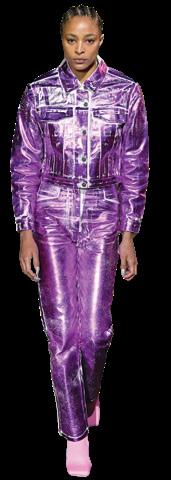


What do Doja Cat, Pamela Anderson, and Charli XCX all have in common? They’re the face of Marc Jacobs’ latest Heaven campaign. The brand is a nod to Y2K fashion (as everything is nowadays) with whimsical colors and cutesy designs with a weird twist. Whether you’re a fan of two-headed teddy bears or not, Heaven has something for everyone!



Big sunglasses have been out of the game for a while, but now that they’re back, we can all feel executive as f*ck. Tiny sunnies had their moment; it’s time for oversized sunnies to make their long-awaited return. Tired? Bad eyebrow day? On one? Trying to avoid everyone? There is no better solution than eyewear that is the cherry on top of any of your favorite outfits.


Just in time to replace the Miu Miu set that was literally everywhere, we all have a new Miu Miu item to obsess over: ballet shoes. Not to mention they’ve got flats and heels. This shoe has been all over NYC, Pinterest, and my dreams. Even if you were never put in ballet as a child, these shoes are an automatic need from the moment you first lay your eyes on them.
To accompany the revival of the ballet flat, the soft girl aesthetic is back. This is also known as the ballet-core, coquette-girl, or pilates princess aesthetic. Baby pinks and adorable florals are printed upon flowing pieces that make you look like you just came back from ballet or spent the day lounging about. Don’t forget to leave the house with a ribbon in your hair.

The baguette (inedible) is a true fashion staple. A long-shoulder bag means fashion and function CAN coexist—and stylishly! A cute bag to hold essentials only; there isn’t an outfit that won’t go with a baguette bag. Whether she’s Fendi, By Far, or anything in between, the bag will always be timeless.


We can thank Balenciaga for this one. Their clothing has become more interesting as time passes, and now it’s looking like they’ve got Kim Kardashian and Alexa Demie in the apocalyptic Met Gala. The fashion house’s style thrives off any attention, even if it’s fit for apocalyptic comparison. The irony is that it reflects the current political, economic, and environmental state of the world we live in. If you wanna look the hottest at the end of the world, look no further! It’s trendy.


We’re done here…for now.

Whether it is Poster-Girl purple, Valentino Pink, or black from head to toe, monochrome came as a trend but is here to stay for good. However, wearing the same color head to toe is not for the weak. Be prepared to impress your friends and enemies. You’ll look totally major.




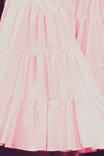
Until next time, this has been the FW2023

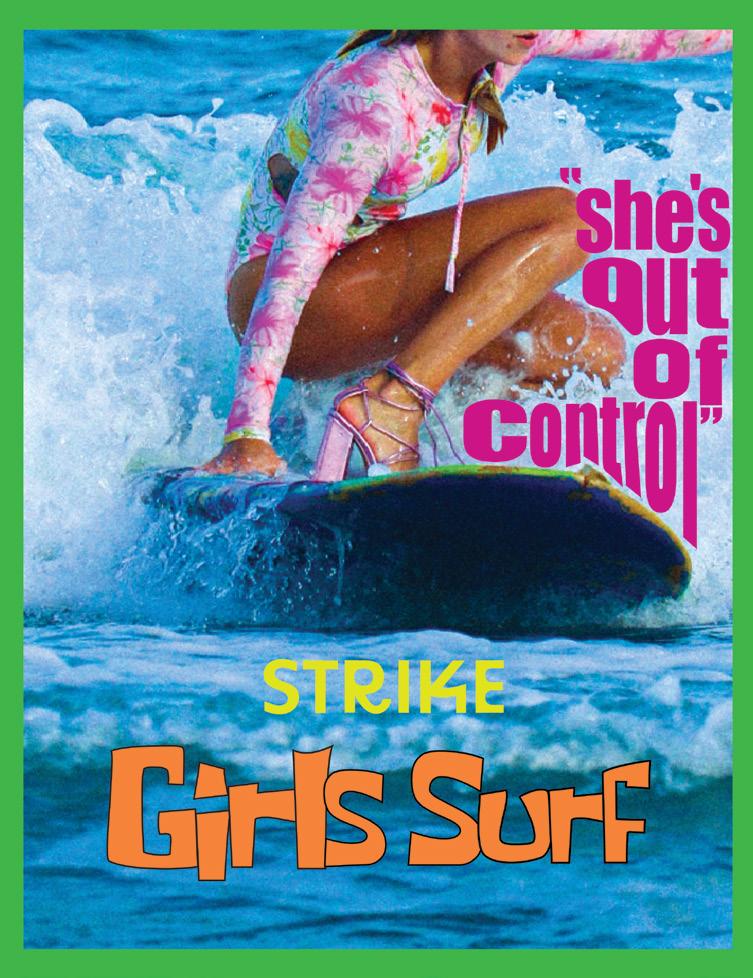
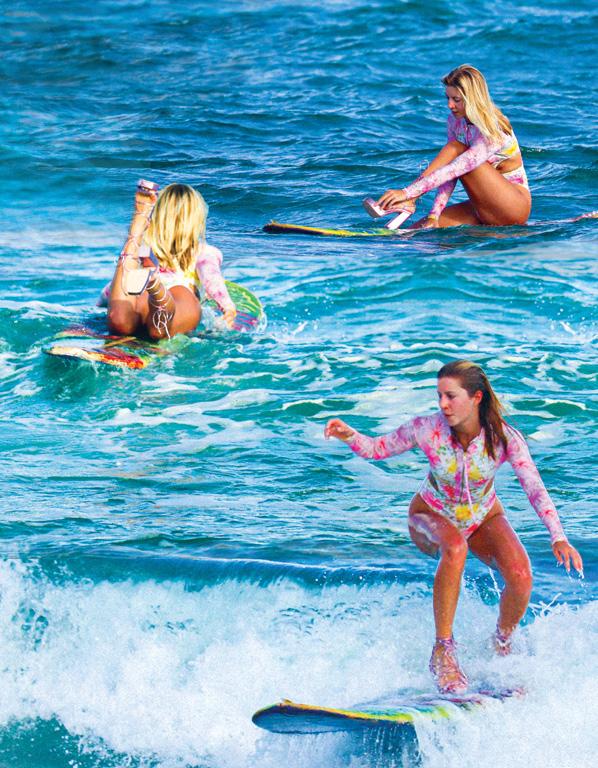

Shoes are the epitome of fashion, making or breaking an outfit with a definitive flair that not every staple accessory can achieve. They are a symbol of both complex individuality and a collectivist craze that is so easy to feed into. Sneakers provide an outlet for artistic expression and experimental fashion through different styles. Those obsessed with all things collecting, trading, and exploring shoes are called ‘sneakerheads.’
Shoes have long since remained a status symbol rooted in luxury, yet there is an attainable nature to the industry. Anyone can be an avid shoe collector and participate in the latest footwear trends, but being a sneakerhead has an heir of exclusivity and elitist membership fueled by intense passion and devotion. The culture of sneakers is an intricate phenomenon that brings people together, but rampant price gauging and gatekeeping have polluted the industry and made both accessibility and attainability a thing of the past. The pressure of having ‘shoe game’ has never been as intense as it is today.
Hypebeast, a Hong Kong-based men’s fashion blog founded by Kevin Ma, was created with a passion for sneakers in mind and is now a leading outlet for men’s fashion and culture. Hypebeast represents the shoe-crazed community but also the focus of men’s stylistic interests. Shoe culture today is warped by the “hypebeast” lifestyle which is defined by futuristic streetwear, luxury, statement, and athleisure styles in which brands like Yeezy and Supreme exist as the blueprint of masculine-marketed fashion. Sneakerheads often embody the ‘athlete off duty’ look with sports-related brands that market both performance and aesthetics; proving that
looking good is just as important as playing well. Although, the thing about hypebeasts is that despite their hyper-materialistic taste, they have garnered a reputation built upon exaggerated style and led fashion fandoms into an intolerable direction by endorsing high markups, and having wavering loyalties.
One of the most shocking aspects of the sneaker market is the incredibly high resale value for “shoe drops” that give fans the opportunity to take part in an even more exclusive subgroup of the industry. With limited editions of popular shoes defined by unique colorways and a stamp of authenticity in the form of a celebrity name, the need to get the latest shoe is heightened. Limited edition collections fuel the “I gotta have it” attitude with celebrity collaborations with top shoe companies such as Donald Glover x Adidas, Cardi B x Reebok, and LaMelo Ball x Puma. Nike Dunk has also collaborated with historically Black colleges such as Florida Agricultural and Mechanical University and Clark Atlanta University.
There is an allure of the secondary sneaker market which is valued at $6 billion. Social media and online shopping platforms such as StockX, GOAT, and POIZON have had an immense influence on younger generations to both buy and sell sneakers. The market is also an incredibly profitable industry as many people purchase shoes and resell them at a much higher price creating intense competition. Obtaining shoes straight from the primary market is more difficult than ever with selective drawings for simply the opportunity to purchase rare shoes, and when not given the chance prices increase by hundreds of dollars on the secondary markets.
The subculture of sneakers started in the 70s and 80s hip-hop era within Black communities. For many groups who engage in the sneaker market, shoes stand for more than just a symbol of money but rather proof of the minority-led cultural influences on trends in fashion. Minorities are at the center of the enduring trends associated with footwear and the iconic streetwear style that embraces the effortless, sporty aesthetic we all know and love.


Sneakers will never go out of style, so when devoted sneakerheads spend thousands of dollars a year on shoes like Nike Dunks and Air Jordans, they make the kind of investment that lasts a lifetime. Compulsive shopping conditions are not necessarily representative of hypbeast culture because of the meticulously curated collections that sneaker enthusiasts develop over years of searching, bidding, and trading up for the latest goods. Some shoes aren’t even meant for wearing but rather exist as symbolic pieces in elaborate collections. The sneaker collector market can be a convoluted business because vintage shoes that are never worn risk falling apart, but value resides in the untouched mint condition of sneakers that are expected not to have a single crease or scuff. Tiktok creators like Nicholas Bennett (@vtgheat) have built a lucrative following based on sneaker restoration while allowing millions to see popular kicks’ physical breakdown and assembly process.
Many sneaker trends have come to pass and cycle back around such as high-top Converse, Keds, Adidas, and Air force 1’s. Both retro and futuristic styles have flooded the footwear market. The future of sneakers lies in augmented reality in which there is value in their design. Users can experiment with newer features such as customization, sneaker lounges, interactive displays, and even virtual fitting rooms. Sneaker fans can create unique colorways and act as their own designers, creating shoes that align with their personal fashion styles. Through these technological evolutions, companies can empower customers and maintain loyal relationships. Brand advocacy is a significant part of sneakerhead culture as top companies like Nike and Adidas garner support throughout every new development and loyal customers often
persuade others to engage in the market by spreading information and creating hype. Though this hype can be harmful when shoes must be certified authentic in order to be valued in the community. Spotting ‘fakes’ can be useful when items come with a hefty price tag but letting people wear what they want should be the standard.
Men may dominate the market as the primary customer but women everywhere also engage in sneakerhead culture. Whether they happen to be an athlete, into fitness, or simply dig the sneaker vibes, women contribute to the footwear phenomenon in major ways. Women work behind the scenes to design trending footwear styles and star athletes like Serena Williams have collaborated with Nike to create custom clothes and shoes. What makes women a minority in the market is the lack of women’s sizing available for the same shoes as men and having to pay higher prices for smaller sizes in some circumstances. To combat this issue, women’s only social media spaces, such as @if_i_cant_wear_snkrs on Instagram, exist to cultivate a unique community that rises above the exclusion that has been happening for years. According to Input Magazine’s article by Giovanna Osterman, “Women-only spaces are changing sneaker culture for the better, and forever.” By cultivating a community of shared shoe knowledge in judgment-free zones, women are empowered by their collective interest in being sneakerheads.
Although times were much simpler as kids when we all wanted to wear lightup Sketchers and roll around in Heelys, shoes today are undeniably chic, sporty, and more diverse than ever. What we chose to wear on our feet is often a direct representation of who we are as individuals and self-proclaimed sneakerheads have a relentless passion for footwear as a form of expression. They engage in a collective mindset that has taken the world of fashion by storm. But it’s time to reevaluate the idea of being a sneakerhead and redirect the industry to the values that sparked the movement from the start. With the right attitude and passion anyone can be a sneakerhead.
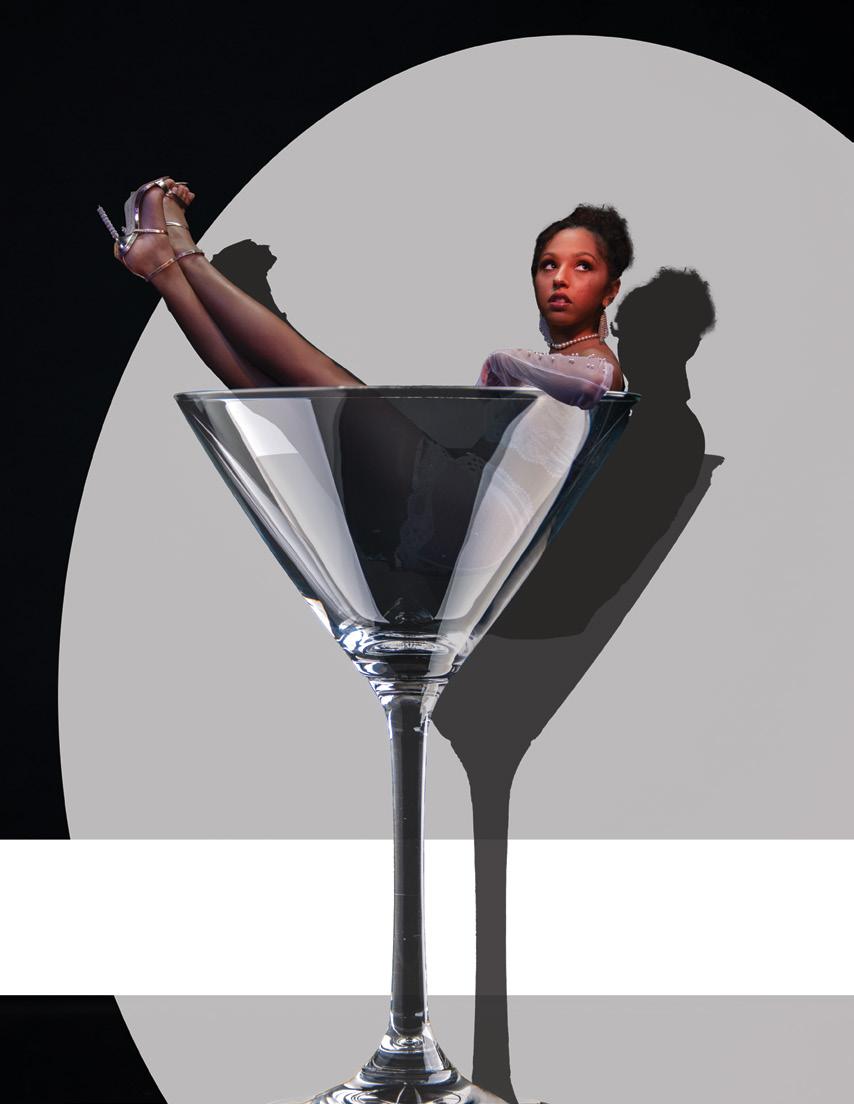


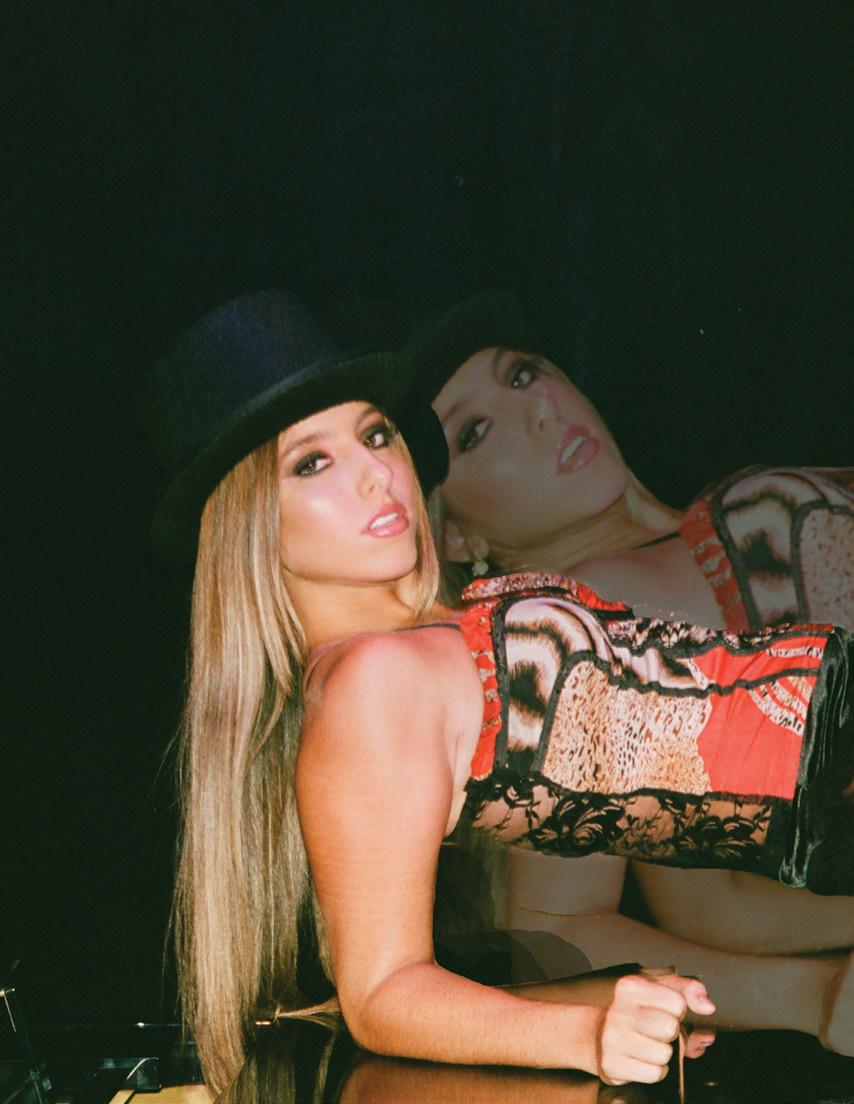
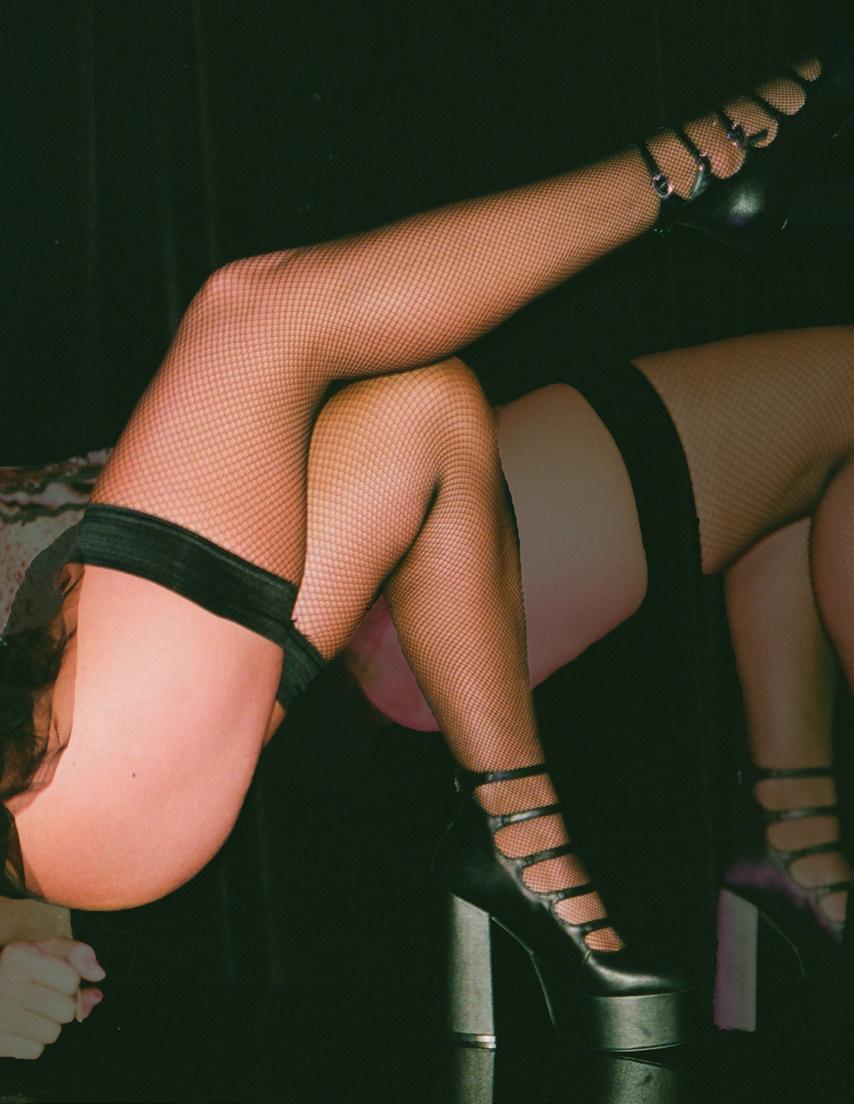
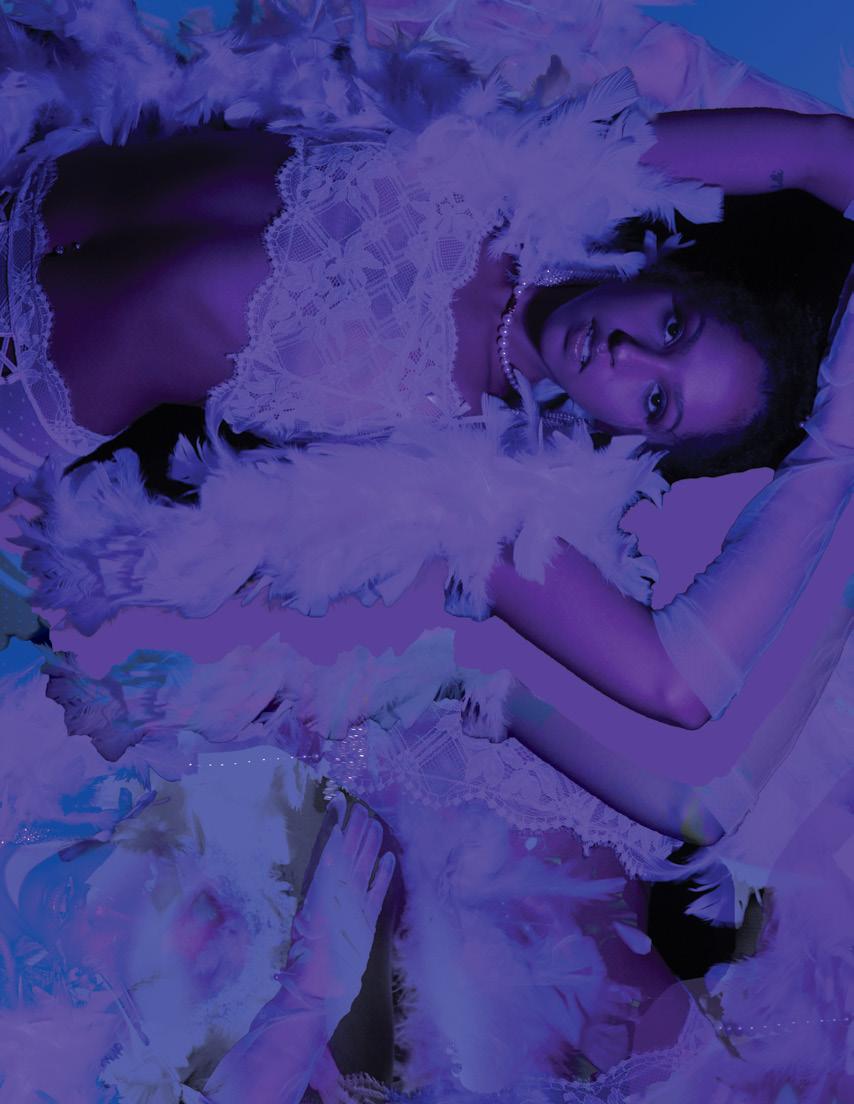
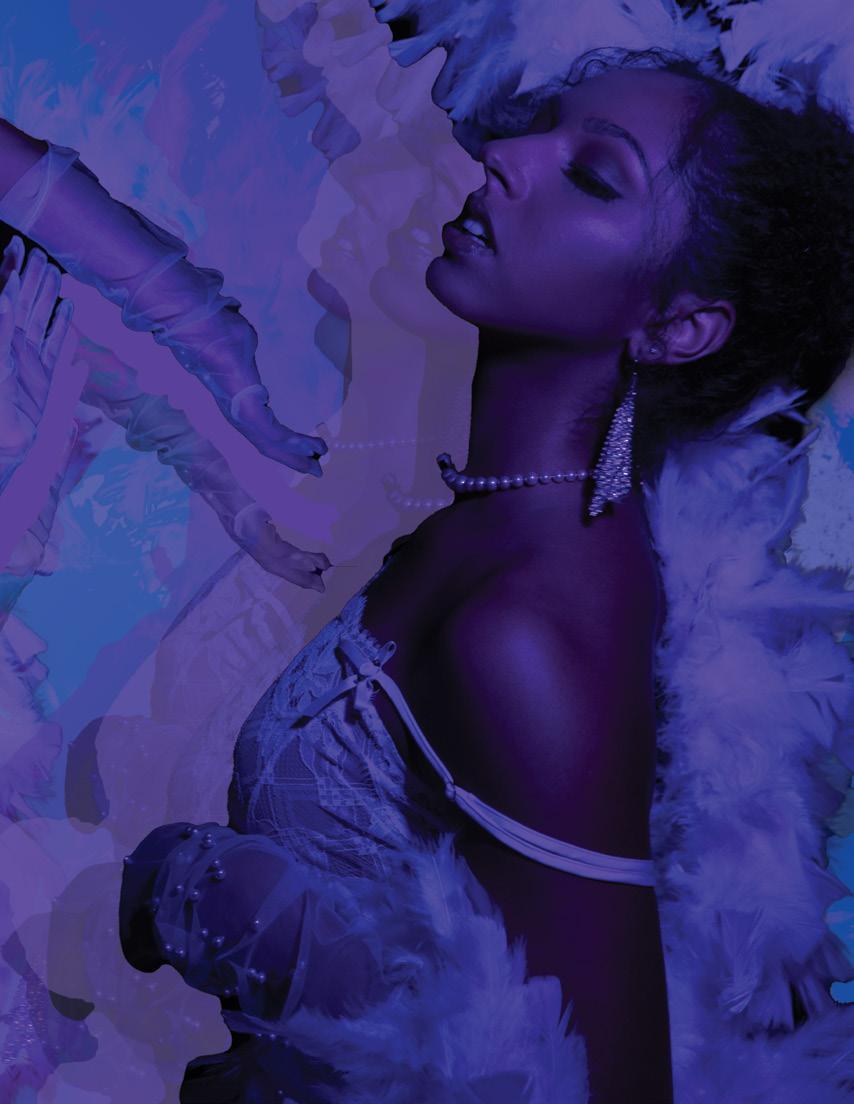
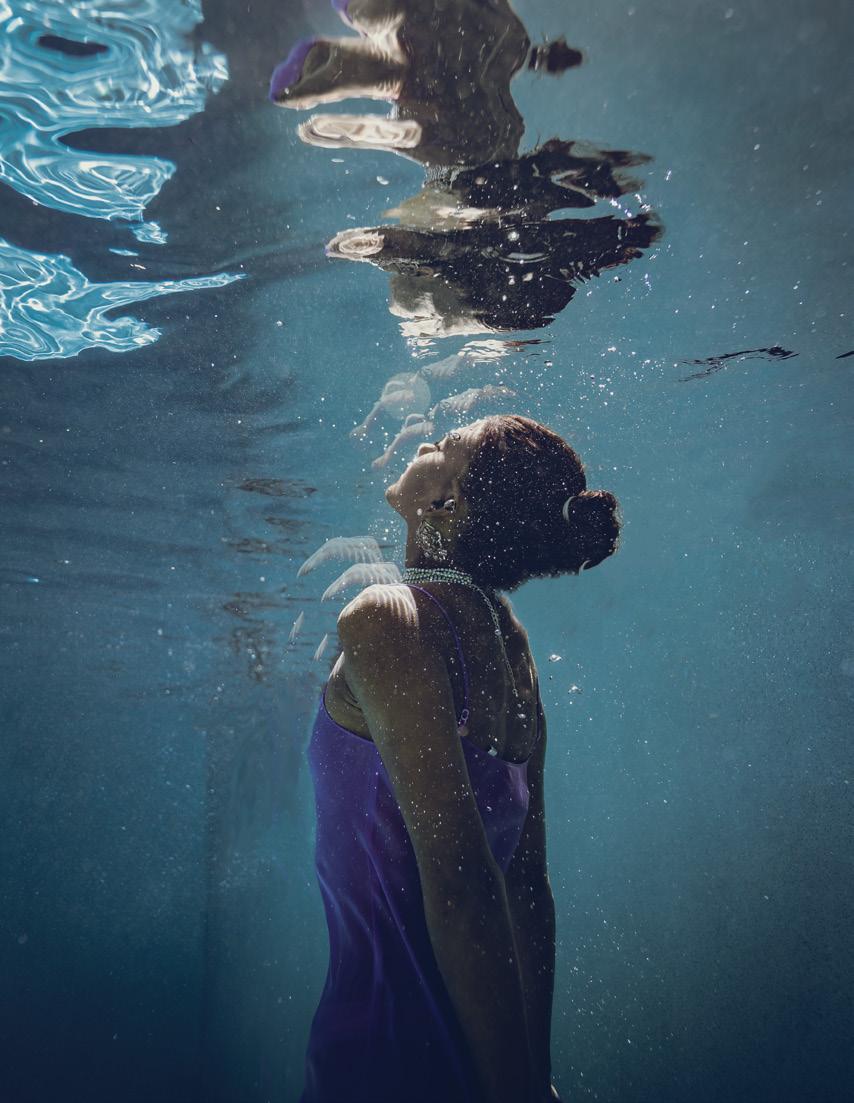
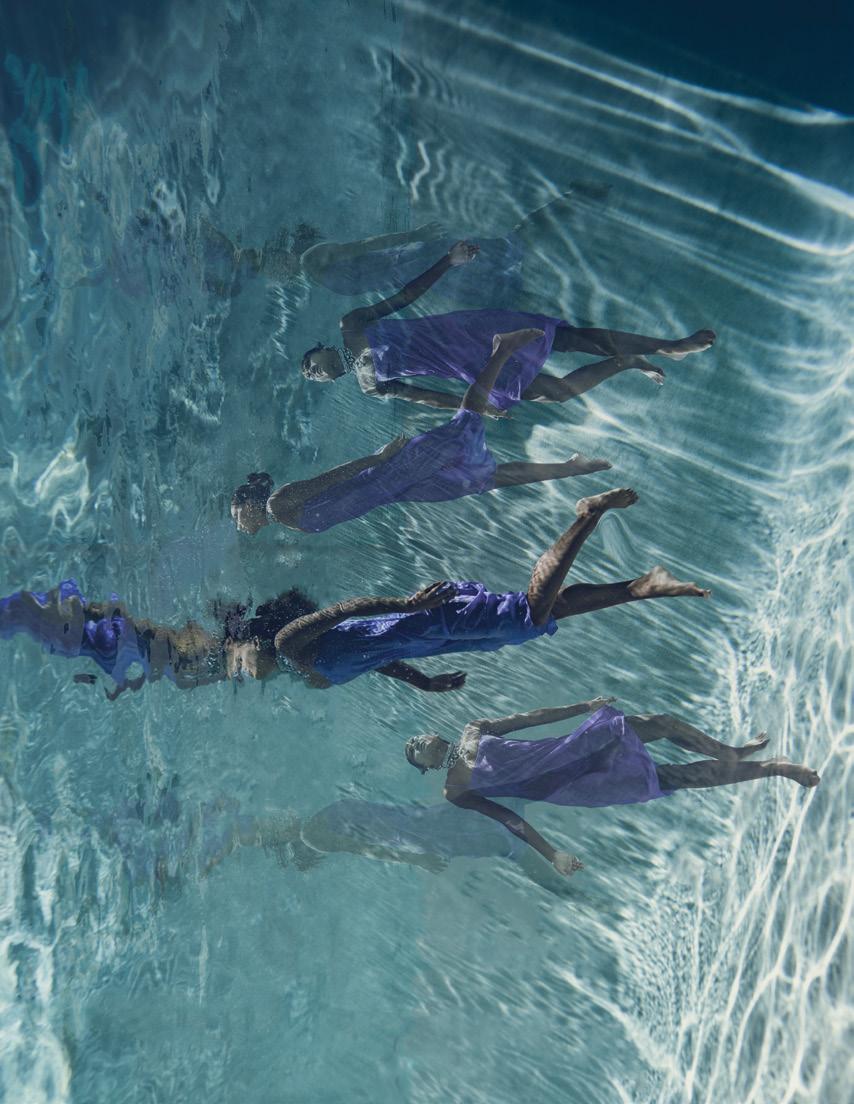
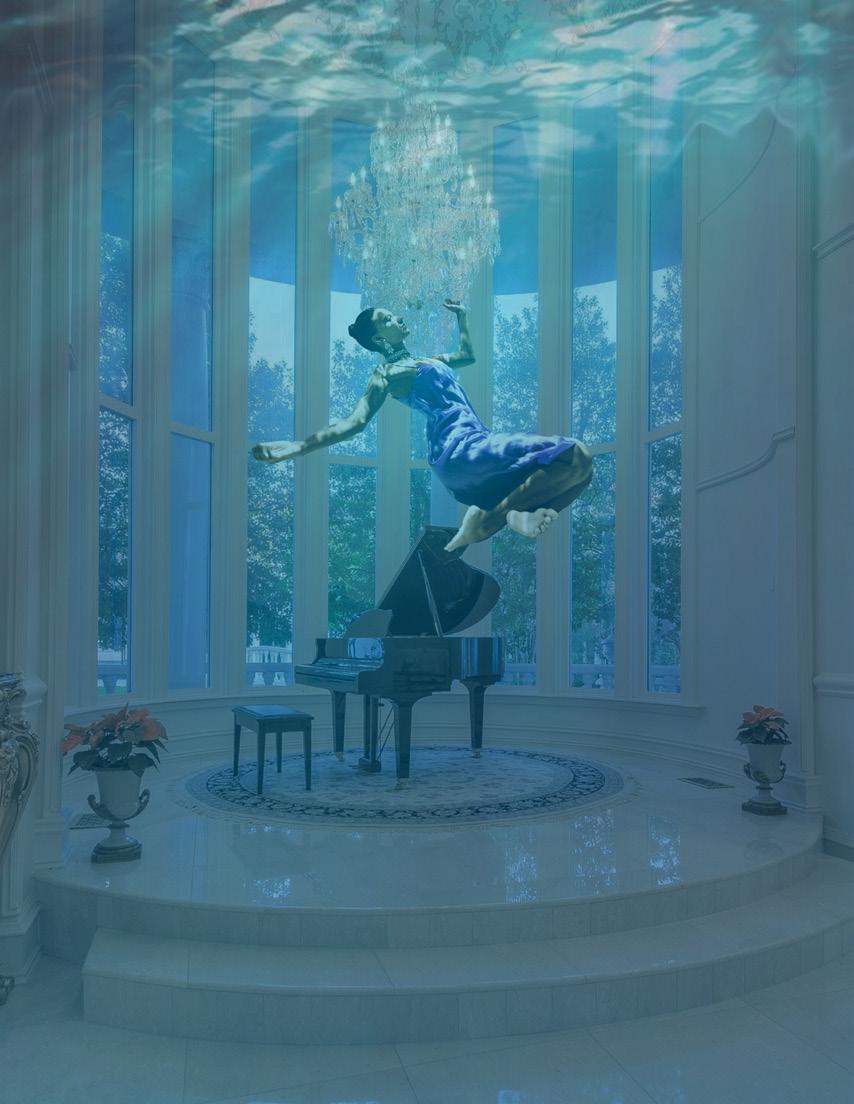


Roujeee Tunes (emphasis on the three Es) has made a name for themselves as a Miami-based DJ collective. The trio is made up of Zunji (Natacia Zunjic), Miluhska (Miluhska Cordero), and Phoenix (Alyssa Lamas). While Miluhska was raised in Ecuador, all three were born in the 305 and now call Miami home. Strike had the chance to spend the afternoon at Natacia’s stunning seaside residence for a joint interview and styling session, and here’s how it went…
A: “So it started in the pandemic. Alyssa and I started learning how to mix in college; we went to FSU together. And Milu was making music as a solo career on the side, kind of diving into it all,” started Natacia. “Yeah, I was going to music school. I had an idea and was like, I need help; I can’t just do this alone. And coincidentally, I posted something on my story of me at school in the studio, and she responded,” said Miluhska. “I called her because I made the title ‘Roujeee Tunes’ as a finsta. I was messing around with the branding and name as I was learning Illustrator. I saw her doing her thing and thought instead of doing this alone, just as a playlist, I could do it with somebody,” Natacia continued.
A: “Honestly, Roujeee happened so organically, and it for sure contributes to who I am as a solo artist. It taught me how to work with others, and I feel like we’ve just gotten to know each other so much through this journey. I learn a lot from you guys. It’s genuinely made me a better person,” said Miluhska.
Natacia added, “It was my only outlet with music, in terms of playing live and stuff. It’s really fun because I get to do it with them. It started as a passion project, but it’s an outlet at the end of the day.”
“It’s so cheesy, but it’s like a sisterhood. We kind of did the opposite; we started the business, and then we became close friends. So it taught me a lot about running a business, but it was also the first outlet that allowed me to dive into music. And it made me realize that I want to do it solo too. So it’s helped me figure myself out,” said Alyssa.
“I saw you and Alyssa doing playlists together and was like, let’s just call Alyssa. Super random,” Miluhska responded. “Nati and I were really into curating playlists in college, and we were always aux at the house parties,” Alyssa reminisced. “Like annoyingly too,” amended Natacia. The girls had a giggle before Alyssa added, “No, like we got there and were like, ‘When are they going to ask us to go on aux?’”
“What’s funny is that we didn’t even plan to be a trio. We just started doing playlists, making collaborative playlists with other artists, and then we started doing live streams. With the live streams, we’d do strict, separate set times,” said Miluhska. “And when we actually got booked to play, we realized real quick that separate and equal set times just weren’t working out. And then one day at the club, we were just like, ‘Let’s play together.’”
“I just wanted to mess with branding and get a color palette. And what’s the first word I thought of? Roujeee. It also represents this fun side—Looney Tunes, playful, vibey kind of energy—which is reflected in Roujeee’s current branding. And ‘tunes’ is just an underutilized word that is so fire. It isn’t deep, but it all worked out for the better because it’s three Es representing each one of us. But no one gets it right,” Natacia answered.
Q: So we know Roujeee Tunes is a Miami-based, badass female DJ collective, but what is it to you all? What purpose has it served in your personal lives?
Q:
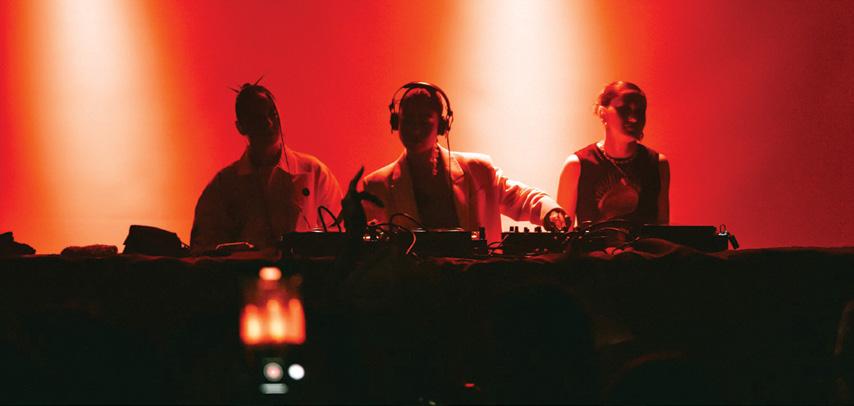 Photographed By Bryson Moberley
Photographed By Bryson Moberley
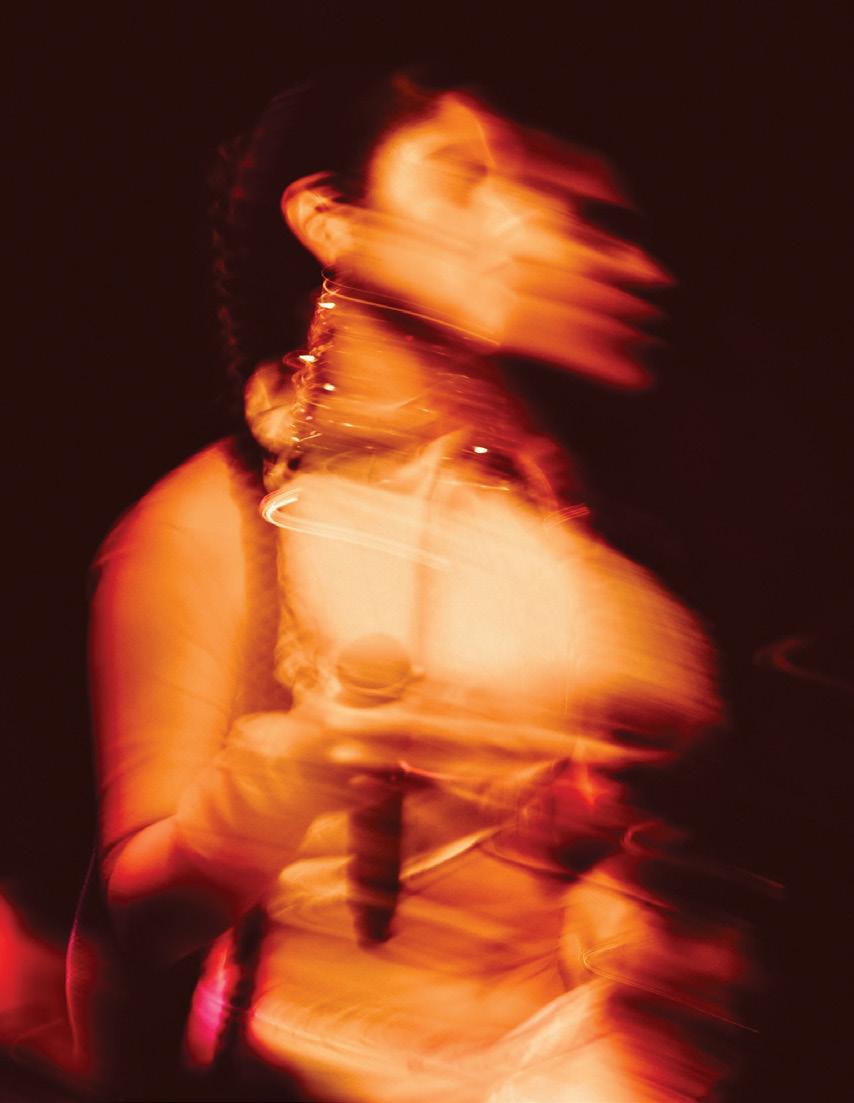

“I feel like we started at a time when the Miami music scene was really starting to grow. In Miami, with the booster restrictions, clubs were still open. Space even created dancing pods. So getting started in conjunction with that, I feel, helped us gain traction really fast. And Milu also has a lot of connections, just a wider scope of people. So I feel like we got really lucky,” answered Alyssa. “And the progression was quick too. We started at DOM’S as a weekly residency,” Natacia commented.
“We were bringing our own table, our own DJ equipment. We didn’t get paid for like 6 weeks,” Alyssa reflected. “After DOM’S, we went 1-800[-Lucky] with Oscar G, a Miami legend. Then the next step was Do Not Sit [On The Furniture], and then we started doing more clubs. It was quick,” said Natacia.
“Nati and I have our 9-5 day jobs. Milu is dedicated to her pop-star alter ego. But it’s still very much a priority. We just didn’t initially expect it to become such a career, but it did. Like, we’re doing taxes. We have an LLC,” said Alyssa. “The most important thing is that it’s fun, and we want to keep it that way,” Miluhska wrapped up.
“We had growing pains. We would fight,” Miluhska admitted. “We didn’t even know our roles yet. We were just going with the flow while trying to figure each other out.”
“Since we weren’t as tight and it all picked up so quickly, it was a weird transition. We had to get tight because financials were getting involved, and it reflected us personally, all while wanting to represent the mutual vision,” said Natacia.
The trio immediately burst out laughing. Natacia began, but Miluhska quickly said, “No, no, that was like back when I played afro-house. Don’t go there.” Alyssa laughed, “We used to say she brings the soul of the jungle.” “Every time I played, they’d just start doing Donkey Kong. I’m just a sucker for bongos and drums,” admitted Miluhska.
“I feel like every time we play together, we have one song that fits our stereotype. When we play with Roujeee, it’s different than when we play alone because we’re forced to expand our music library and try to match each other,” said Alyssa. “You have to read the room constantly and feel it out. I think we’re all very good at reading the room and making sure it’s what fits the vibe and not just what we want to play. We do, but in a tasteful way where we meet the crowd halfway,” Natacia finished.
“Oh, when we first started running a business,” started Alyssa. “We’ve all made each other cry. We were just figuring out how we communicated, and how we worked was all different. It’s like a relationship with learning how to communicate your needs.”
The girls began to sound off names. For Miluhska, it’s Solomun and Peggy Gou. Jamie xx for Natacia. And Danny Daze, Nick León, Coffintexts, and Jonny From Space for Alyssa.
Q: Describe your experience breaking into the Miami music scene. Was it more of a slow start or did things pick up rather quickly? And how was that adjustment?
Q: What has been your biggest challenge as a trio?
“Our first time playing at ATV, for sure. That was our first club gig, and it was so much fun. We were so excited,” Miluhska answered. “And nervous,” added Alyssa. “Also, we were styled for our first gig at Space.” “Yeah, that club is why I started DJing,” agreed Miluhska. “But I loved that first gig so much because I feel like that was the first time we felt we belonged. Like this is what we’re supposed to be doing.”
“And we crushed it,” Natacia confirmed.
Q: What is a goal you have for Roujeee Tunes going forward? Large or small.
“I mean, we originally wanted this to be a collaborative music platform, and I think that it steered away from that once we started DJing because we were just focused on that. But the goal is to go back to those roots and make it a collaborative music platform, especially for women. And I eventually want Roujeee Records to be a thing,” said Miluhska. “I would also love for us to play in other places,” added Natacia. “Oh, global,” Miluhska agreed. “Obviously.”
“And I want to see us come out with a sickening merch line—something currently in the works,” Natacia hinted.
Q: Lastly, what’s one thing outside of Roujeee Tunes that your listeners likely don’t know about you?
“I’m not easily satisfied anymore. I’m a lot pickier,” revealed Miluhska. Alyssa added, “You definitely have to choose what you want to use your energy on. Since I now work for Space, I go to the same venue every weekend and am friends with many of the DJs I was a fan of. I love to go see them; they’re awesome. But I went to a club in New York and was like, ‘Wow.’ It was so nice to wait in line, not know anyone, and be just a club-goer, ya know?”
“I’ve turned into such a homebody. I take a lot to leave my apartment because we do a lot of sh*t like that. And I work a lot. I don’t go out as much anymore; partying isn’t as fun; I’m more conscious of the music and the price of drinks,” Natacia laughed. “It’s good that at least one of us is like that. It’s a perfect balance,” Miluhska admitted.
“Personally, I love cooking. I love food,” revealed Natacia.
“I like writing and film photography. And I’m obsessed with skincare and holistic healing,” Alyssa said.
“Oh, I love writing,” agreed Miluhska. “I started writing poems, and that’s how I started writing music,” she concluded.
Q: You guys have taken on some rather iconic venues like III Points, Club Space and more, but what has your most memorable or favorite performing experience been so far and why?
Q: Since your jobs revolve around the club scene, how has that affected what you all do for fun or on a night out for pleasure?


As I grow older, I often reflect on my teenage self and what she would think of present-day me. 15-year-old me just wanted to be seen as someone who could bring value to the table, even though she didn’t even know what she could offer. She was figuring out so much. Not only what she was good at but what she genuinely liked. When my teenage self realized what she not only liked but loved, it just became a part of who I was. And who I currently am. I was in choir, a theater kid, and a massive fangirl. You name them; I’ve had a Twitter account for them. I saw myself in people and loved them passionately. I’ve left the fan account days behind me, but that’s not to say my fangirl days are over.
Being a fangirl taught me to be my most authentic self. If you’re reading this and you have no knowledge of fangirl culture, you must be confused. Because what does having a fan account for Justin Bieber at 14 years old have anything to do with being your most authentic self? First of all, back in the day, Bieber was an extremely polarizing figure to be a fan of (honestly, has anything changed? lol). So whenever I was vocal about my passion for him or his music, I was immediately shut down. My family members thought I was being “foolish” for how much I loved him and my so-called friends at school saw me as “extremely obsessed” over someone who didn’t know I existed. I mean, duh, but let a girl live, won’t ya?


Fast forward 10 years. I’m no longer crying in my room listening to “Down To Earth,” but I am still a fangirl who will show love to my favorite artists where I feel it’s deserved. Enthusiastic and passionate are two words I’ve always held close to me. They would either be said as a compliment or in a shameful way. Hearing the latter as a teenager wasn’t ideal, that’s for sure. Nonetheless, I learned to live with it. The more I grew older, the more I would hear the word “cringe” instead of the usual “how embarrassing” thrown around. It became essential in my peers’ vocabulary, and I must have also said it at some point. “That’s so



cringe, why do you like them,” “don’t be so cringe,” or “I would never be that cringe” were some of the phrases you would hear. After self-reflecting, I came to terms with the fact that I was “cringe.” I embodied being “cringe” and what it was all about. Enthusiasm, caring, and basically dancing like nobody’s watching are all traits of being “cringe,” according to society. Taylor Swift gave her NYU 2022 doctorate speech back in May of this year and gave out different pieces of advice. Amidst all her tips, she said, “Learn to live alongside cringe. No matter how hard you try to avoid being cringe, you will look back on your life and cringe retrospectively. Cringe is unavoidable over a lifetime. Even the term ‘cringe’ might someday be deemed ‘cringe.’” She continued by saying, “I promise you, you’re probably doing or wearing something right now that you will look back on later and find revolting and hilarious. You can’t avoid it, so don’t try to. For example, I had a phase where, for the entirety of 2012, I dressed like a 1950s housewife. But you know what? I was having fun. Trends and phases are fun. Looking back and laughing is fun.” While one of Taylor’s “cringe” phases was dressing like a 1950s housewife, mine was sitting in my room from the ages fourteen to sixteen crying because I wasn’t going to be Mrs. Bieber anytime soon.
I had to come to terms with the fact that being enthusiastic and loving things dearly was my “internal cringe.” Once I was released from the shackles of what was or wasn’t “cringe,” I really didn’t care if I looked or seemed cool to people. At the end of the day, we live on a floating rock! In space! So, post those stories where you talk about your favorite artist. Even though people might not care, you do. Go to that concert alone. Life’s too short to miss out on things just because you don’t want to go alone. Give that guy your number. You never know what might come out of it. All these “cringey” situations are only cringey because we make them out to be. Do it for the plot and have fun.


 Art by Deana Dieujuste
Written by Bella Kubach
Art by Deana Dieujuste
Written by Bella Kubach
In the U.S. today, the political climate is rigid. There is no longer a middle ground. The 2020 election, for example, was saturated by the media, and soon enough, every detail of the candidates’ lives was plastered on the internet.
At the time, it was clear which news outlets were favoring what parties and candidates. However, true journalism was never supposed to reveal bias. In fact, its whole purpose is to deliver unbiased media coverage.
DIn recent years, political topics have seemingly consumed our news sources. Whether it be the New York Times, the Sun Sentinel, or the Washington Post, some political story is always making the headlines. Truthfully, everything in society seems rather political today. People now even go as far as judge your political beliefs solely based on your appearance. I didn’t know a septum ring could cause so much chaos at Thanksgiving.
In such a confusing political climate, many Americans have avoided politics altogether. Or, they’ve neglected to turn to CNN or Fox for news for fear of bias. As a result, Gen Z is turning to TikTok, Twitter, and Instagram

as their news sources. The truth is these social media platforms are the breeding grounds for spreading misinformation and bias. Often, the influencer dispersing the news is not qualified to be doing so. The internet is in a vicious cycle of consuming information without checking sources.
The media is so quick to believe flashy information seen on TikTok, but who is their favorite influencer getting their information from? Who are they partnered with that might sway them to say certain things? Cite your sources, please!
As college students, we often learn the harm in trusting information from disreputable sources. We’re forced to compile extensive works cited pages for this very reason. But in the same breath, we believe every exciting headline we see in the media. Today, it seems like social media is our journalism. Newspaper died. Are blogs next?
The fact that many Americans consume their news from Facebook should not be a fact we own proudly. In fact, it turns society into a giant game of telephone. One person reads something crazy online, spreads it to the next, and so on. But who’s to know if that information is fact?

Trusting information on social media so blindly is insulting to the journalists who dedicate their lives to dispersing unbiased media. While some may have hidden agendas, most do not. Most journalists have the objective of informing the world about pressing issues. In fact, some journalists risk their lives reporting overseas. Despite the
danger, foreign correspondents are necessary for society. We need someone to be able to report on global issues from places that we are unable to travel to.
In 2021, UNESCO called attention to the safety of foreign correspondents. They said, “Foreign correspondents are affected by growing hostility and violence towards the press, including gender-based violence and harassment against women journalists as well as killings.” Female journalists, specifically, are targeted when reporting in countries where women do not have the same social status as men. Additionally, some countries like to censor their media. Officials in these countries

may become hostile if they do not like the media the journalists are planning to report on.
In America, we have freedom of the press. However, many countries in the Middle East lack that right. Although, many things occur there that deserve media coverage. In efforts to uncover this information, journalists are met with hostility. In a report conducted in May of 2021, there were 348 cases of threats and violence against female journalists globally just in the first quarter of the year. Furthermore, many journalists have been jailed in foreign countries simply for reporting.
Journalists are not only seen in a negative light abroad, though. Many government officials dislike the press because of the light it sometimes casts on them. Journalists have the responsibility to unearth information that is only sometimes nice. Only some of the information we consume can be digestible. Journalists are responsible for bringing injustice to the forefront and holding people accountable for their actions.

With general hostility towards the press,
people have refrained from participating in interviews in recent years. As a student journalist, I’ve seen hesitance in many of the people I ask to interview. The person being interviewed often wants to ensure that their name will only be disclosed to my teacher and classmates. For all my assignments, this is no problem, as none of my stories are being published. However, it is alarming how fearful students are to answer controversial questions.
This fear likely stems from the current political climate. With so much extremism, people are hesitant to answer on pressing issues that might stir drama. They are fearful they will receive backlash from someone with an opposing political opinion. But when did we, as a society, become unaccepting of the opinions of others? We need everyone to think differently to maintain balance in our communities.
Journalists dedicate their careers to uncovering these differences. Most school systems do not broadcast current events. However, we must stay informed on local, national, and global issues. What’s happening in other countries

does actually affect us. The whole world works together to exchange resources. When one country is under duress, we are all impacted somehow. However, most foreign news is not presented to us unless we seek it out. Our education system neglects to teach us about some of the most pressing issues.
Despite the negative stigmas that surround journalists and their careers, journalism is not, in fact, dead. It can’t be. We rely on it to present our news that we would have no way of obtaining otherwise. Besides, we need to use it as a source to fact-check what we hear from social media influencers. Newspapers may be outdated, but general news is as important now as ever. Today, and for the foreseeable future, we will have to rely on journalists to report until we can get robots to do it.

They are fearful they will receive
from someone with an OPPOSING
But when did we, as a society, become
OF THE OPINIONs OF
It’s something too many people have to go through—cheating. One of the worst feelings in the world is discovering your partner was intimate with someone else. It’s like someone twists and pulls your gut out…then forces you to swallow it. If you’re in a classroom of college students, chances are that half of those college students have been affected by infidelity in one way or another. Either they have grown up with an unfaithful parent, were the product of an affair, their first love cheated on them, or they were the ones doing the cheating. There’s probably a new article published every week about what it feels like to be cheated on. I have read countless advice columns on grieving through the pain of infidelity: How to Move On in 10 Days, Is It Ok to Stay?, 5 Reasons Why Your Partner Cheated, —It’s all old news.
Something that is hardly discussed is the stigma around cheating. What stigma? There’s a stigma? That is the response I got when discussing some of my points with friends. Yeah, I would say there’s a pretty big stigma around infidelity. I’ve encountered many people who are embarrassed to admit that they’ve been cheated on, that their parents didn’t work out due to infidelity, or that they are the reason their relationship is ruined—because they weren’t faithful to their partner. If you fall under any of these categories, whether you are cheating or being cheated on, it’s important to understand that there’s no need to feel ashamed. Just take a look at these statistics from the LA Intelligence Detective Agency: 74% of men and 68% of women say they would have an affair if they knew they would never get caught. 30% to 60% of all married individuals will engage in infidelity at some point during a marriage. 57% of men and 53% of women admit to committing adultery in a previous relationship.
There you have it. It happens. A lot. The statistics show that just because people aren’t doing it doesn’t mean they aren’t thinking about it. So is everyone just a little f*cked up, maybe? Maybe we all have those urges sometimes, and some of us are just better at suppressing destructive impulses than others.

Bear in mind I am in no way, shape, or form trying to condone infidelity; this is me trying to explore why people do what they do. From my own experiences, it’s always been difficult to comprehend how you can love someone and still be unfaithful. If you love me, how could you even think of anyone else? Through the anger, it took me sitting down and being honest with myself. I admitted that I thought of other people; I just had more self-control and maturity than my partner. I also may have respected him more than he respected me—clearly.
The happiest of couples can go through an obstacle like this. Anyone can. In a healthy relationship, one’s reason for cheating probably is not because they are unhappy with their partner. Rather, they have low self-esteem and need constant validation, and overall are unhappy with themselves. To add, when people spend their entire lives rule-following and keeping up with society’s standards, breaking the rules and living on the edge can be thrilling. Some people are addicted to the exhilaration which sometimes comes along with cheating. When people are happy in their relationship, it’s less likely that the partner practicing infidelity has fallen out of love with their partner. They’re either in love with the daring feeling of having an affair or the affection they get from the person they have an affair with.
I spoke with a friend of a friend, *Sam Carlson, who has cheated on a boyfriend. Carlson dated her boyfriend for a year, describing their relationship as “fun and strong.” Yet, she ended up cheating on him—with a coworker—for six months! So obviously, my first question was: why exactly did you do that if your relationship was strong like you say? She explained to me that she loved the constant attention she received from her coworker. It boosted her self-esteem. “I felt guilty every single time. I was so scared he’d find out,” said Carlson. Thankfully for her, he never did, and she doesn’t think he ever will.
Written by Lili Jahromi Art by Melania Zilo

For many, it isn’t easy to understand how someone can be invested in their boyfriend and want to keep their side piece simultaneously. “I wasn’t really invested in him as a person, just the attention he was able to give me. I cut him off finally after a few months. I regretted it every time, but I kept doing it anyway. I would give myself validation by convincing myself it was okay because I get the attention I need from my coworker,” said Carlson. “I was 100% in the wrong. He didn’t deserve it at all.” Carlson and her boyfriend have since ended, but for different reasons. He still does not know about the affair.
Usually, more consequences surround the cheater than the recipient. One of the most obvious consequences of cheating is losing your partner. You’re human, you made a mistake, and now you must own up to it and deal with the outcomes. If your partner decides to leave, it’s something you, as the cheater, must respect and understand.

After adultery occurs, whether you decide to stay in the relationship or not is nobody’s concern besides you and your partners. I personally think it’s great that some couples can work past problems like infidelity. But another consequence that may arise is constant trust issues. Honestly, as annoying as it may be, you, as the cheater, have to deal with the possibility of missing out on parties because you’ve given your partner reasons to not trust you.
Carlson offers some advice for those who struggle with the guilt of cheating. “I think you learn a lesson from it, and it shows that you can love someone and care for them so much, but that doesn’t mean they’re the right person for you. Everything happens for a reason. You can only learn from your mistakes. Cheating is never good, but remember there was a reason why you felt that way, to begin with. Usually, if you cheat, you either aren’t secure with yourself or your relationship.”
Mistakes are part of human nature, but they don’t make people bad. You are violating your partner’s trust in the worst possible way when you cheat, and it will hurt him or her. Your ability to acknowledge your mistakes is what separates you, as a cheater, from a bad person.
*Name has been changed for privacy

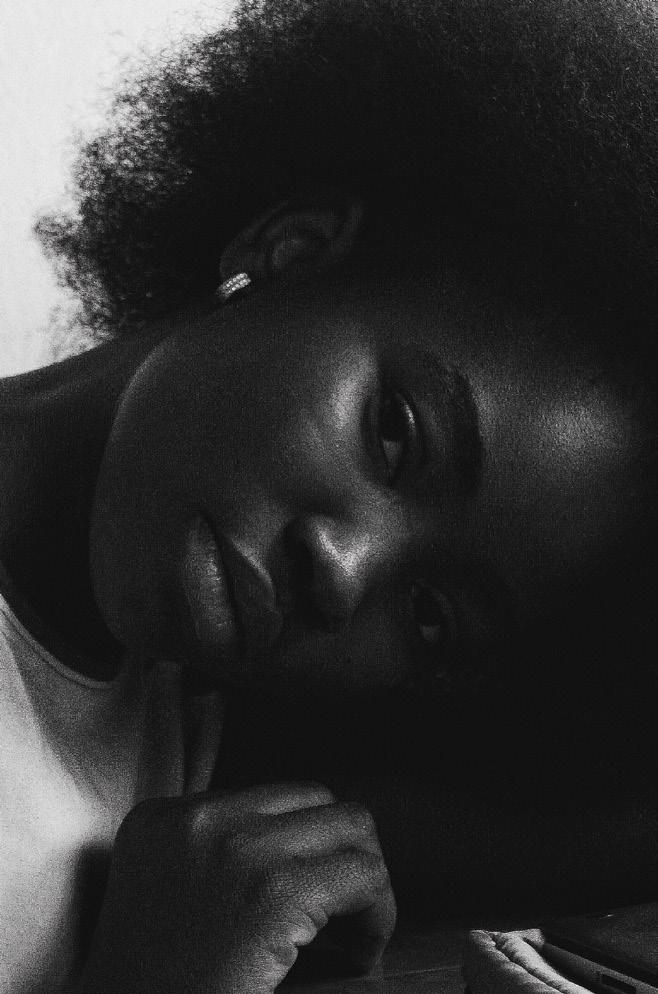 WrittenbyGael-LynnLaguerre ArtbyMelaniaZilo
WrittenbyGael-LynnLaguerre ArtbyMelaniaZilo
“At first, if you’re unaware of covert racism, that stuff makes you feel good. Because you feel accepted because you’re cool, but that’s not what that means. They’re saying I’m a digestible Black person. It’s a dangerous ideology to have and remain in those circles. I’ve dealt with naivety for so long. You don’t want to go through your life believing everyone is awful, which is why as a kid, I let so much slide. There’s a guilt that I believe Black people feel because looking back on microaggressive situations, they feel robbed.” - Tai Beasley, 21
“I had a close white friend in high school call another girl a slave and the n-word over text. When I confronted her, she tried to make an excuse. As soon as she opened her mouth to defend her actions, I walked away, shocked that this was someone I had been friends with for so long. After a long phone call and her crying, I cut off the friendship. Had we ever argued while we were still friends, would she use the same language as me? It’s a two-way street; if you’re calling another POC these derogatory things, I’m thinking of myself being in that same situation.”
“I also dealt with having friends that have racist partners, which is also a major red flag. Why are you hanging with people that are actively racist and go against the values of my entire existence? I am not a sidekick.”
“Having white peers not caring about checking the racist behaviors shown by friends in your life is something I feel threatened by because you don’t even value who I am as your so-called friend.” - Alyssa Quarrie, 20 “I would even say in my prior relationships, I’ve always been described as, ‘Yeah, you’re Black, but you’re not like that kind of Black girl,’ so I’ve definitely faced a lot of microaggressions and tokenism. As a Black girl who grew up in predominantly white spaces, I do think I’ve encountered a lot more experiences that have been unconsciously repressed as a result of it.”
“I would say the Black Lives Matter (BLM) movement that took place during Covid really set the time for me. I realized a lot of people who I thought were my friends were not, and that’s when it became apparent to me that, ‘Hey, you are the token friend.’”
- Mikaelah Davis, 20
Tokenism is an extremely consequential issue people of color face that is rarely addressed. In the workplace, it appears when companies recruit a small number of people from underrepresented groups to give off the facade of both sexual and racial equality within the workforce. Tokenism has a similar impact on personal relationships. This includes white peers using your friendship or companionship as an excuse to be microaggressive.
Many marginalized groups face this issue intersectionally; those of Asian descent face model minority stereotypes, people that identify as LGBTQIA+ deal with the gay best friend stigma, and Black Americans deal with being the “only exception.” As a young dark-skinned black girl who attended schools in a predominantly white community my entire academic career, I was accustomed to being placed in this role. I was used to being an outlier; many classmates rarely acknowledged my race in an uplifting way. The media is guilty of tokenism as well; most famously, Dionne from “Clueless,” played by Stacy Dash, Bonnie Bennet from “Vampire Diaries,” or Chris Rock in literally every movie he’s ever been in. Viewing these TV shows and movies with the token trope brought two things to my attention:
1) Black people are only acceptable in small amounts.
2) We’re only tolerable if we have personalities that don’t necessarily threaten whiteness.
It seems like the world is run exclusively by white people trying to sell the idea of diversity, all while failing miserably.
Naturally, minorities that deal with these similar situations in their personal life are used to tuning microaggressions out. Whether it’s to stay in a job, sports team, or even a friend group, it’s all rooted in an underlying fear of being penalized for giving racists the satisfaction that their stereotypical perceptions are true. Sometimes these remarks won’t register in their minds until the incident is long over. This is where feelings of guilt and insecurity begin to accumulate overwhelmingly.
Others will also brush stereotypical comments off, reassuring themselves into believing that it “wasn’t that deep.” It wasn’t until I experienced racists being comfortable around me that reality slapped me across the face. It all goes much deeper than you could even fathom.
Growing up, I was prideful of my race and Haitian background. While extremely outgoing, I struggled severely with debilitating insecurities in middle and high school. Resulting in me developing a lack of boundaries (like absolutely none). I wanted everyone to like me, never wanted to start drama or be mean-spirited, even if it meant being compliant with microaggressions thrown at me.
Except, it wasn’t until enrolling in my high school cheerleading team that I faced the harsh reality that race had to do with everything. Being one of three Black girls on an Xtra large team, I overlooked countless incidents of subtle remarks, stereotypes, and blatant racism. Many of these girls were childhood friends who I thought viewed me the same. But soon, I was forced to realize I was never seen as simply funny or a social butterfly; I was the Black girl before anything else. Yet I remained silent, mainly because I was outnumbered.
The initial incident that made me realize I was just a token to my white teammates was when they began to make flat-out racist remarks towards other Black people in front of me. For instance, while cheering at a football game, the opposing team’s quarterback left players trailing behind in his dust and scored a touchdown. My coach decided to make a remark that caused other white teammates to laugh. When I asked what was so funny, she said, “No, it was a bad joke.” I went on to another teammate I considered my friend to tell me what was said. As she giggled, she revealed the coach said, “That must be how fast he runs from the cops.” I told her that wasn’t funny at all, and she had the nerve to disagree.
Another moment was during practice; I was back spot and, of course, the only person of color (POC) in my stunt group. I stood directly in front of the girls as they began talking about specific Black first-year students being “reckless” at a homecoming after-party the night before. One of my teammates decided
to refer to a girl as a “Black B*tch,” only to turn then and look at me and say: “Oh, sorry, Gael, I forgot you were here.” An eruption of laughter followed soon after.
Frozen in disbelief, I felt an explosive anger wash over my body. They were confident in disrespecting me because they viewed me as their “get out of jail free” card. Using what they would consider a “relationship” with me as an excuse for being racist. I didn’t fit their bigoted perception of what a Black person was like. I was their layaway. To them, being “not too aggressive” or not having an AAVE accent meant I could be tolerated. It’s almost as if they felt cool with flaunting their bias in front of me. I hated the fact that those girls were comfortable enough to act this way so openly. But I hated myself even more for allowing it to happen without saying a word. All I could do was showcase my disgust on my face and walk away. In all actuality, I was afraid that if I reacted the way I truly wanted, I could jeopardize my spot on the team. Either way, this just made me feel even more invisible and helpless than ever.
Cheerleading was my passion throughout my teenage years. I worked my way up from varsity football cheer to the competitive team, achieving two state championship titles. My ambition for the sport was strong, hence my turning a blind eye toward its well-known racist history. According to the Institute for Diversity and Ethics in Sport, NFL teams as a whole are 70 percent black, but inclusivity stops right there. There is an undeniable disparity in the amount of Black women cheerleading versus white women. The eurocentric beauty standards of the cheer realm make it difficult for BIPOC women to express themselves without restrictions, especially when it comes to options for hairstyles and makeup, something I experienced constantly.
I can still hear the warnings my parents would always drill into my sibling and I’s brains:
“Life’s colors are not always pink,” or “You will always have to work twice as hard.” All BIPOC living in the United States grow up self-aware that we will ultimately face severe racism at some point in life. Meanwhile, this does not mean we always have to limit our abilities or refrain from developing friendships. It is always important to be kind while setting standards for how we want to accomplish goals and want others to treat us. We must hold people in our lives accountable for their actions.
Microaggressions should never stop BIPOC from pursuing their passions; they should make you work even harder for your own gain. Yes, you should continue to play any sport if it makes you happy, regardless of being one of the only two POC on the team. It makes you stand out even more; they just don’t want you to realize it. So take advantage of it! It’s not easy; you will sometimes feel hopeless like I have. Let go of feelings of regret for how past situations have gone. It is 10x more difficult to navigate a world when its systems were built to benefit from your struggles. Still, never let the anxiety of discrimination hold you back from joy and achieving goals, even if they require you to be uncomfortable in certain environments. Relish in your culture always and never be ashamed.
And for those reading this who are white, recognize your privilege in every setting. Racism is taught but can also be unlearned through acknowledging offensive ideologies. If you truly love your minority friends as much as claimed, there should be no issues repping for genuine inclusivity unapologetically. That being said, it’s important to note that your Black friends are not obligated to be your history teachers. It is mentally exhausting to overly explain the hardships and trauma we face. With the technology we have access to in this day in age, information is at our fingertips. Deciding to remain ignorant is an inexcusable choice.
 WRITTEN BY MELANIA ZILO ART BY SABRINA SYLVESTER
WRITTEN BY MELANIA ZILO ART BY SABRINA SYLVESTER

It was September, and I didn’t have any Friday night plans until a friend called me up, telling me about a local band playing a show that night. After work, I went home and put on my dancing boots. When I got to the show, I realized two things: I should’ve worn thicker socks, and I was at the coolest high school party I’d ever been to.
The Borin Brothers’ show was electrifying, their sound hypnotizing. I remember dancing all night; the first half of the show was an invitation for the audience to let go and rock out as they performed a selection of alternative rock with bluesy undertones, each chord radiating into the crowd with an indescribable intensity. This is what music is supposed to feel like, I thought to myself.
The Borin Brothers are relatively new to the South Florida music scene but have not wasted a second in the spotlight. The band is made up of three brothers, Daniel (15), David (17), Andre (13), and their longtime friend Thalys De Paula (16). The group has been playing music together for years and decided it was only a matter of time before they started pursuing a real career together.
3 months later, I haven’t missed a show, and the boys are shooting their first editorial with Strike. Next thing you know, the amplifier is plugged in, and we’ve turned our garage into a private concert, the music vibrating through our entire block. Within minutes, our neighbors popped open the car’s trunk, and we created an impromptu tailgate with a live show. Earlier that week, I sat down with the boys at the fitting to talk about all things sound evolution, hopes and dreams, and high school groupies.

Let’s start simple: who are you?
David Borin: “We’ve all been playing music since we were super, super young, and we all come from the same musical background and stuff. Growing up, we started playing at our church, but obviously, there are some limitations when it comes to what kind of stuff you can play, so we decided to create our own band. I would describe our sound to be more of an alternative rock vibe? We’re passionate about music and seeing people react to our art.”

When did this all happen? Where does your passion for music come from?
Thalys De Paula: “I met the brothers when I was going to school with them, and we quickly became close friends. My family had grown up in the church, and I was constantly surrounded by music. It’s something that my mom had ingrained in me. When I met the boys, we had a lot to bond over. I would come over to their house, and we would just jam for hours and hours and hours… Wait, what was the question?”
Photography by Sterling Smith , Sage Holaway, and Melania ZiloAndre Borin: “She asked where you first started.”
Melania Zilo: “Your first memory playing music or something? Does anything come to mind?”
Thalys: “Growing up, when we lived in Massachusetts, my mom was doing housekeeping, and this one lady was going to throw away an old keyboard that she had. My mom saw it and asked if she could bring it home for me instead. We couldn’t afford music lessons at the time, so I would sit there and watch Youtube tutorials, trying to learn a bunch of different stuff. I first realized that I was passionate about music when I learned My House by Flo Rida. It was the first song I ever learned on the keyboard.”
An eruption of laughter explodes from the couch as Thalys starts humming the opening to everyone’s favorite 2015 banger.
Melania: “What about you, Daniel?”
Daniel Borin: “Probably seeing people play the guitar at different shows or even church. I was really drawn to the sound of the guitar.”
How did the band come to be?

David: “My dad just texted me one day in March asking us if we were ready for our first gig, and we weren’t even a band yet; we were just friends playing music. Next thing you know, the four of us are in rehearsal, getting ready for our first show. Honestly, it was confusing.”
Daniel: “We were ready for it; it was just a matter of time.”
How did you figure out what you wanted to play?
Daniel: “We started with John Mayer covers because, at the time, we only had one original song that I had written separately. Slowly we began to incorporate more rock. A little alternative but honestly just really loud music.”
Andre: “I think we’re still kinda figuring it out.”


You put out your first single, Middle Seat, today. How does that feel? What was the process like?
David: “I started writing the song because my dad had shown me this picture of my brothers and me, super young, sitting in the middle. I didn’t know what I wanted to do with that, so I just started writing about being caught up in the middle of something. It’s about confusion and finding your way out of a situation.”

Thalys: “David came up with the idea and got the chords and lyrics, and then we would all get together and rehearse and work on the song together. It came easy, which was surprising. I’d be working on the second verse while David was working on another part, but the four of us just came together and worked on everything here and there.”
David: “The most surprising thing about the songwriting process was how quick it was. It took two minutes.”
Daniel: “I remember exactly when we were trying to find the bridge for the song, and we just stumbled upon it.”
Andre: “Yeah, we all went crazy.
The song kinda changes keys.”
Daniel: “A little modulation for you.”
Melania: “You’ve been playing quite a lot of shows more recently.”
David: “Yeah, this third show we did, we tried to go all out with the stage and the lights. I remember getting on stage and seeing, I kid you not, maybe 250 people out there; it was a crazy feeling.”
Andre: “The cops shut us down after the second song, so we moved it to our backyard.”
What has been the general reaction from your friends and peers after starting the band?
David: “The girls dig it.”
Daniel: “Nobody didn’t love what we were doing. Even the people you would least expect to enjoy our music supported us.”
David: “I was surprised. Even our high school principal was into it.”
Andre: “What’s not to like? We’re young, and we make good music.”




What’s a pre-show ritual that you have?
David: “For the boys and me, we surf.”
Andre: “Yeah, we try and make it out to the ocean. Surfing is great because you can get lost in your thoughts, and it’s really peaceful. Until you see a shark; then maybe not so much. Right before the show, my stomach is going crazy because I am so anxious to perform. But then we just say our prayer and go out there and have a good time. Everything melts away, especially after the show when we talk to everyone who came out to support us. Knowing that people are enjoying our music is a big motivation to keep moving forward.”
How would you describe the band’s fashion style?
Daniel: “I don’t know exactly. I feel like our styles tie into each other, but we’re all very different at the same time. I would say it’s a little distressed and grungy.”
Andre: “No skinny jeans.”
Andre: “But seriously, you have to feel comfortable in what you’re playing in. You gotta play the part, too; you gotta dress like the music you are playing.”
What are you most excited about in 2023?
Daniel: “Getting in the studio really, really soon. We want to work on the quality of our sound.”

Thalys: “I’m looking forward to growing as a band and finding our sound. I’m excited to show people what we can do.”
Andre: “Also, just feeling good about the music we are putting out there. Pretty cliche, but I want as many people to hear our music as possible. I also want to play at cool venues if we can.”

David: “More shows! Every time we do it, it’s the best time.”




Growing up as kids in the early to late 2000s, there was only one other major decision that was monumental to our society, and that wasn’t choosing team Edward or Jacob. It was either declaring yourself as a Disney or Nickelodeon fiend; in many cases, we were both. I can speak for us all l when I say being on either of the two channels was every kid’s dream. Many of us begged our parents to take us to auditions to live out our childhood star fantasies like the ones on the big screen. I still hear my mom’s aggravated response to my pleas as the radio ads for casting calls blared on the speakers during every car ride to school.
We glorified those channels with everything in us, living vicariously through the stars on our screens. The constant daydreaming of Hollywood and how much better it would be than the 5th grade. How could life get any better than the parties, the glamor, and the fame that fell into these child stars’ laps? Our innocent minds would be reveling in the fact that these stars had the world at their feet, living without knowing the definition of stress. Little did we know how lucky we were never to face the dark underbelly of many of these networks. Fame has been a facade to many of our favorite child stars as they were inappropriately taken advantage of and overworked, causing them to struggle immensely in their adult lives. In recent times, with encouragement from the infamous #MeToo movement that took down wolves like Harvey Weinstein in 2017, countless child stars of popular TV shows we know and love are shedding light on the mistreatment they dealt with from production behind the scenes. Social media has provided a platform to expose truths of Hollywood’s biggest companies and directors, grounding tycoons who once believed they were
out of reach. Stars and staff of both Disney and Nickelodeon have just now found the strength to reveal the real monsters hiding behind these vast corporations, spreading awareness of these predators hiding in plain sight.
This year, many of our favorite stars came out to talk about the issues of exploitation they faced as children that had stifled them through adulthood. Demi Lovato, 30, just opened up about the detrimental toll her work as a Disney child star had on her livelihood. The singer detailed her awful treatment during a conversation shared in an interview with “Call Her Daddy” podcast host Alex Cooper. During this episode, Lovato revealed the intense schedule during her time with Disney that caused her to call her mother crying out of exhaustion. “What people don’t know is how much work we had to do,” the singer recalled. “Every year, I filmed a season of a TV show, went on tour, made an album, and shot a movie, and I did that all for like three years.”
Lovato was constantly threatened with replacement. She had to go along with the brainwashing the company relayed. As the primary breadwinner for her entire family, she feared losing it all. Her management also became controlling what she ate at only 17. There were several times her hotel room would be barricaded just to limit her access to food. As someone who had previously dealt with an eating disorder as a small child, the micromanagement only exacerbated Lovato’s symptoms. Like many child stars, the extreme workload put a lot of pressure on her to keep a perfect image as a role model, causing her to become addicted to drugs and alcohol as a coping mechanism. Disney stars faced exploitation through manipulation and fear of being let go.
Hearing this saddens me as the well-deserved downfall of Disney has yet to come. Lovato plans on gathering more of her Disney coworkers to share their testimonies for a documentary.
In addition, Nickelodeon only seems to be following the same fate as its counterpart. In a recent Insider report, countless former employees ranging from female writers to child stars addressed show writer Dan Schnieder’s tainted legacy. He was fired in 2018 following an investigation that found he had verbally abused colleagues. Schnieder had been responsible for creating hit shows like The Amanda Show, Drake and Josh, Victorious, Zoey 101, and the beloved iCarly. His creations turned Nickelodeon into a multi-billion dollar network. However, Schnieder allegedly hired teenage girls rather than female writers on his shows. Jenny Kilgen, one of the only two female writers on The Amanda Show, accused the production company of gender discrimination, citing frequent requests by Schnieder for “massages.” Though not explicitly named in her 2000 lawsuit, she explained in a letter all the embarrassing things he would come to her to do for money. The case settlement was an undisclosed amount.
However, the abuse was not just behind the scenes. Countless allegations against his toxic workplace behavior shed light on his set directives for teenage girls to be overtly sexual for the “sake of comedy.” Alexa Nikolas, who played Nicole on Zoey 101, claimed Schnieder encouraged filming a “goo” scene involving 13-year-old Jamie Lynn Spears to mirror a pornographic money shot. “They were putting stuff on her face to make it look a certain way.” Nikolas faced isolation during filming because she didn’t want to participate in many of the sick scenes Schnieder implemented. Victorious actress Danielle Monet added that her outfits were nowhere near age-appropriate. She stated she would not wear most of that attire even as an adult in the present time. “Do I wish certain things didn’t have to be so sexualized?” Monet asked. “Yeah, a hundred percent.” Monet faced punishment after expressing discomfort over filming a scene where a fictional guidance counselor pumped lotion on her face. This resulted in her having fewer scenes in the show than her fellow cast members.
There seemed to be a pattern of blackballing stars who spoke up about this exploitation. But it would only continue and become even more
disturbing with Schnieder’s creation of the web series “The Slap” for exclusive character videos linked to the show Victorious in 2010. One part of the website was called “Cat’s Random Thoughts,” showing a young Ariana Grande character self-taping mini-episodes from her bedroom. Schnieder wrote and directed each of these episodes. Grande, who was only 16 then, was shown sucking her toe, trying to “milk a potato,” and pouring water all over herself while on a bed, saying, “I’m soaking wet.” Even as an 11-year-old girl, I would not watch “The Slap” simply because I thought it was so weird. The fact that each of Schnieder’s scripts had been read thoroughly and approved makes me sick to my stomach. If even as a child, I found this off-putting, it makes you question the actual audience half of this stuff was directed to. Much of this disturbing content was viewed in compilations commenting on the inappropriate scenes, racking in over 11 million views on YouTube and across social media. That definitely made me realize I wasn’t the only one creeped out.

More recently, actress Jenette McCurdy alleged in her memoir I’m Glad My Mom Died that a Nickelodeon creator would frequently supply children with alcohol and request massages on set. She was even offered $300,000 worth of hush money to not come forward about the abuse, which she declined. These claims were painfully similar to the decades’ worth of allegations made against Schnieder. Most of these stars’ stories have been boosted by the resurfacing of footage, lawsuits, and allegations spread across social media.
Many of us argue over social networks’ impact on society. However, they have helped bring communities of people together while also holding evil people accountable for their actions. Child exploitation is a sickly common issue in Hollywood. Many of those affected are now gaining the confidence to speak up, knowing there are millions of people supporting them. However, the problem of child exploitation in Hollywood remains dangerously prevalent. It is essential to evade victim blaming and advocate for the safety of child actors. With this in mind, companies and producers will begin facing exposure to repercussions that people in privileged positions have usually been able to successfully avoid. This is only the beginning of the end, where all the rotten eggs in show business will soon be cast out of the basket.

every day it feels like someone is getting canceled. An influencer puts a fish in the wrong-size aquarium. Suddenly, everyone in the comment section is a vet, and now that user is “canceled.” Oh, and that other TikToker? The one that only makes videos about their hot takes on music? Yeah, they got banned for saying Tyler the Creator is overrated. So many nonsensical things get enough people riled up to get people entirely removed from a social media platform—instead of hitting the block button. The internet has socialized so many people to be hyper-aware of numerous social, political, and cultural issues. It’s to the extent that people feel the need to police one another—especially if their views don’t align.
Social media is already programmed to be tailored to your liking. All the content you consume lets these platforms know what videos to keep sending your way. By guessing and getting it right each time you hit the like button on a video, you’re telling these platforms to keep it coming and not change what you watch. The algorithm knows what you like and what to send your way. This is done to keep you on the app as long as possible. Talking about this at a glance doesn’t seem like a problem to most people. Who wouldn’t want to see content on their page that reaffirms what they believe in? Your algorithm knows exactly what you enjoy. Who are you to hit block or “not interested” on an influencer or content creator you genuinely enjoy? You’ve finally curated the perfect feed for yourself, the ultimate social media dream. And it isn’t a bad thing. As mentioned, this is what anyone would want and is the end goal for these social media platforms. Your little piece of the internet becomes an escape from reality and the business of your life.
But one day, you come across a video you normally wouldn’t watch. It feels out of place for something like this to pop up on your feed. You go to the comments searching for people to agree
on how absurd the video is, but instead, everyone is agreeing. This disruption in your feed might make you uncomfortable, making you inclined to hit that “not interested” button. Another reaction to this might be to play hero and fight people in the comments when all you had to do was read and scroll. It’s in this kind of situation that algorithms being so customized to your liking becomes a problem. Instead of being open to what others might have to say, there’s a want to either double down on your opinions and beliefs or ignore them entirely.
Now it isn’t a bad thing to disagree with others on issues. After all, that’s the art of debate. It allows people to broaden their perspectives on certain matters and think about them in ways they had not thought about before. It’s when people start attacking one another instead of understanding that this becomes a problem. Coming for other people online for their beliefs, morals, or opinions on the basis that you disagree with them only polarizes and reaffirms their already present bias. All it takes is a simple block to have you stop showing up on their feed. Some people will even take it a step further and report your account—which can have you suspended or possibly banned from the platform.
This hyper-policing of others on the internet is doing more harm than good. Today, people can’t simply talk to one another because they decided that not making dogs go vegan is the worst thing ever or putting milk before cereal is wrong—here lies the problem. The internet is a space that’s meant to spread knowledge and ideas. If its basic function can’t be fulfilled without everyone coming at one another for thinking differently, then we’ll have abandoned social media accounts of people that thought differently. This socialization isn’t good for anyone and can harm so many people. If everyone is hyper-aware of how they are online, so much so that everyone acts the same, then how helpful is it, to begin with?


Something about red lipstick, a Harley Davidson, Bruce Springstein, and daisy dukes make me so proud to be an American. When you think of living the “American Dream,” you think of a James Dean look-alike sweeping you off your feet to a rock concert in a dive bar. Something about sex, drugs, rock ‘n’ roll, and the scent of Bud Light reminds us all of our old American homes.
In our nation built on apple pie and roofies, we take pride in many things, for one, football. In “one nation under God,” Sundays aren’t reserved for worship. Rather, football. We were the first to invent tailgates as an excuse to get sh*t faced and think about how hot Tom Brady is. Greatest nation ever, right?
 Written
Written
We also take pride in our music. Something about the loud, clashing sound of rock music soothes our brains. Elvis? Our king. We look past the fact he began courting his wife when she was only 14. Age gaps are hot, right? I mean, it is legal.
Relationships with large age gaps are even romanticized in society today. I can’t imagine you’ve never seen an “I <3 MILFS” shirt on a middle school boy or heard Lana Del Rey sing about her love for older men in a Lolita kinda way.
You probably find “stepmom porn” hot, and that’s okay. We live in America! Home of the free!
We may look past our favorite rockstar’s relationships because we invented rock ‘n’ roll. It’s essential in our society. Aerosmith, Led Zeppelin, Mötley Crüe, Ozzy Osbourne. Something about a leather jacket and heroin addiction is so hot. It’s no secret that many rock stars in the limelight struggle with substance abuse. But if they sound good, who the f*ck cares! We’ll pity their addiction problems when they make headlines in our favorite tabloids. We wouldn’t dare talk about how hard it is for Americans to receive therapy or rehab treatments. A penny out of my taxes? No way!
I mean, who wants to pay taxes anyways? It’s going to help maintain highways? We’re working on flying cars anyways! Just ask Elon Musk. In America, in Elon Musk, we trust. He’s on the way to replacing our teachers with robots! What do we need teachers for anyway? They do teach us everything we need to know
to be active members of society with little to no pay. And every so often, they’re expected to act as human shields against the bullets from an unbanned, unregulated assault rifle. But school is a drag. In ‘Merica, we can do anything we put our minds to. That’s what the Constitution says!
The ten amendments were created for a reason. So, that’s what we live by. Look at the first amendment: freedom of speech. Take that, North Korea! Other countries don’t have as many freedoms as we do here. That’s part of what makes America such a dream! You can talk about anything you want. You can drag anyone you want. As long as it’s not the carrot with the toupee!
I mean, look at Agent Orange. He had no political background, and he evaded his taxes. Still, he was the 45th president of the United States. So, when your mom tells you that in America, you can be anything you want, she really means it. I mean, George Bush Jr. got the gig after his cocaine use made headlines. When the public was asked if they still supported him, 8 in 10 Americans said they didn’t care if he did the drug. Pay for him to get rehab? Hell no. Not out of my taxes! Elect him as the 43rd president of the United States? Sounds more like it.
In America, sure, we have flaws. But, in what other country can you eat a hotdog and drink shitty beer in the back of a pickup truck that was once filled with water as a makeshift pool? I can’t think of one! Next time you think of disrespecting the “land of the free,” think about how good McDonald’s fries taste. Yeah, 41.9% of Americans may suffer from obesity, but isn’t
 Photography by Sterling Smith
Beauty by Sam Acello
Styling by Ava Davison and Isabella Van Gaasbeek Model is wearing top from By Chlothing Store
Photography by Sterling Smith
Beauty by Sam Acello
Styling by Ava Davison and Isabella Van Gaasbeek Model is wearing top from By Chlothing Store
that what liposuction is for? Here, in the U.S., we rarely have to face the consequences of our actions. That’s part of what makes it so great!
Sure, you can buy a gun at the ripe age of 18. How else are you going to protect yourself? We’re allowed to buy a gun and go to war 3 years before we’re legally drinking alcohol! How logical is that? And if you don’t like it, then leave. The second amendment granted us the right to bear guns, and that’s how it will remain. Although, To Kill a Mockingbird is more regulated in schools than guns are. ‘Merica!
It’s hard to name what really is the best part of the American dream. I mean, we invented fried food, spray cheese, NASCAR, spring break, The Real Housewives, Mountain Dew, Airstream trailers, and red solo cups. Could it get any better?
For some reason, Gen Z deemed “cigarette grunge” and the “Americana aesthetic” as the ultimate epitome of America. Miss Americana, Lana Del Rey herself, gained fame from faking these very aesthetics. Lana Del Rey was Lizzy Grant before Lana Del Rey even existed. For years, she tried to perform as herself but was not successful. It wasn’t until she threw an American flag behind her and started singing about Coca-Cola, cocaine, and her “daddy” that she grew a fanbase. And oddly enough, the fan base consisted of 13-year-old Tumblr girls.

 Model is wearing vintage Lip Service vest courtesy of Txchnicolor
Model is wearing vintage Lip Service vest courtesy of Txchnicolor

To everyone else, this might not be so desirable. But in America, it’s all we could ever want. But do we really care what anyone else thinks anyways? The most essential part of being American is automatically assuming everyone else speaks English. Oh, and assuming that everyone knows how sweet it is to be from the land of the free!
We may be crazy, but we’re free (outside a classroom, movie theater, church, nightclub, or a shopping mall).
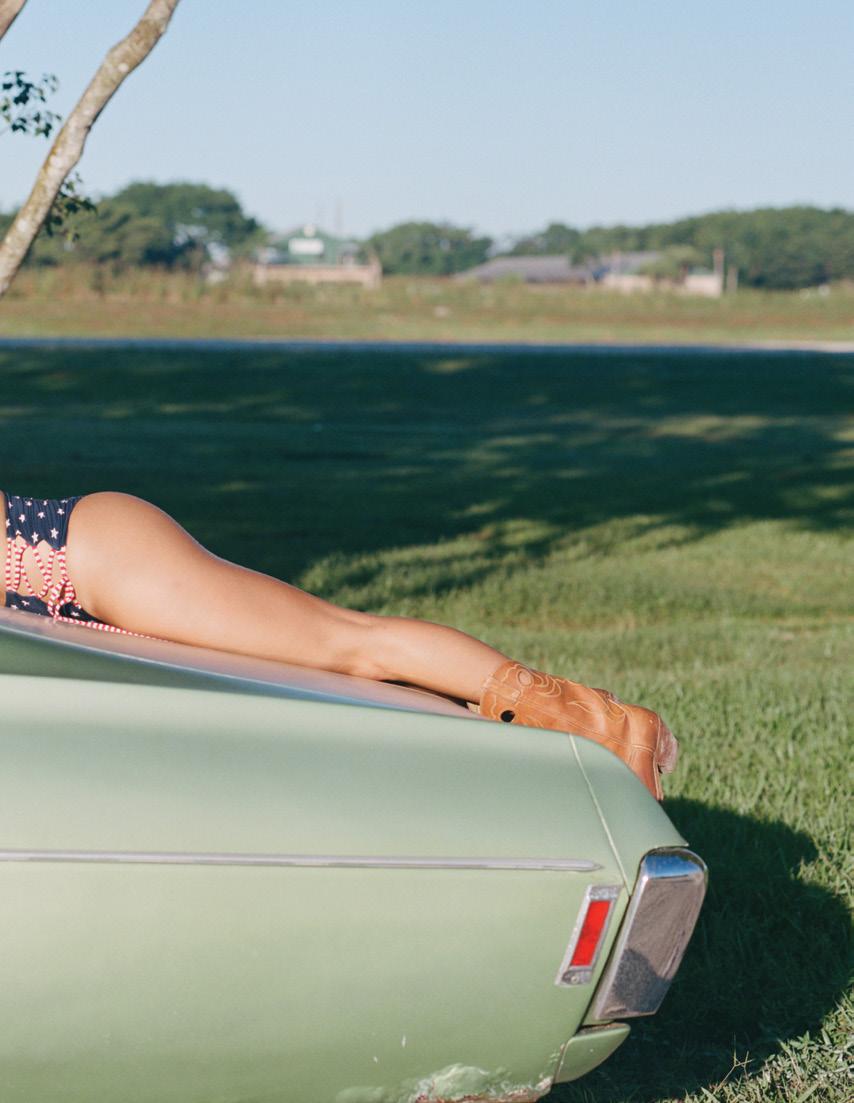


The home of the free. America, the beautiful. Be anyone you want to be, In America, you can play your role. All that’s owed is one small fee, Your life, paid in full.
The more we try the more we fail. Stuck in a cyclone of outdated ideologies, Unable to break the cycle of injustice. What do we do? How do we prevail? Can we give anymore apologies When evil is our accomplice?
Presented with two choices we choose the lesser. A crockpot of cultures and we decide to embrace only one. A plentiful river of goodness and we opt for hate. Capitalistic class dividing the people, Condoned violence, Social inequality uprising unrest.

We The People can’t figure it out. We The People can’t get it right. We’re forming a less perfect Union, Obstructing justice, demolishing the general welfare, And withholding the blessings of liberty. Will we ever change?

The death of this America is the birth of integrity. The day it dies begins the days we truly live. A culture born from the ashes of old habits that died hard. Striving for something new, something greater. Let’s try this again, A new American dream.




How close are you to your phone right now? Probably within arm’s reach, and you’re waiting to pick it up again after you had it in your hands less than 5 minutes ago. How many times a day are you hopping online? The number might be more than you’re willing to admit. These questions are not posed to invoke shame but rather to bring awareness to the norm of our society. In this age of technology, religion seems to be phasing its way out of the mainstream. It is starting to be replaced by the internet and media. The way our society has evolved to lean on the internet and our favorite forms of media as a source of information, morality, and lessons reflect similar parallels to the way earlier societies leaned on religion to guide them. Religion has been the traditional way humans have guided their way through life and its absurdity. However, with the evolution of the internet and its pervasive role in our lives, it seems that religion has taken a backseat as guidance in life for many young people.
Millennials and Gen Z are statistically the least religious people in America, and it’s no coincidence that this generation was raised on the internet. Religion has historically served as an amazing guideline for how people and societies should live their lives and interpret the world around them so they can inherit a higher purpose. However, public sentiment on faith reflects a disconnect between itself and young people. For some, the strict rules, confusing language, or radical followers have made young people feel like it’s outdated. At this same time, the internet has come to serve a similar purpose that religion does for its followers.

Being chronically online can be to blame for why religion fails to resonate with a lot of the younger generation. Constant contact with desensitizing information can alter people’s perception of the world, making it hard to believe in a higher power. How often are we reading and seeing videos of tragedy on social media, leaving us to only show our support through “thoughts and prayers?” Not only this, but the internet is a breeding ground for discussion and debate. Lessons taught through stories are the traditional framework for most religions. Now, search engines can pose the same questions and get a hundred million results in a fifth of a second. Links to articles and videos of the most outlandish theories and conspiracies that make believing in a God sound more reasonable are easily accessible to all of us as long as you have a Wi-Fi signal. This ability of the internet to grant answers that religion once served to answer has made many people feel as if religion is obsolete.
Religion and its trait of granting a sense of community is no longer a unique one, thanks to the internet. Before the internet, American society built its identity on patriotism and faith. Every morning in schools, classes would come together and pledge allegiance to the United States of America, one nation under God. Nowadays, we find our sense of community online, and it’s so expansive that religion cannot compete. The internet has granted us access to connect with people all over the globe, sending us to places where we share similar interests. Social media algorithms are intelligent enough to link you to different parts of the internet where they believe you’ll belong. The sense of community through the internet is more valuable to younger people than through religion because it’s also less judgemental. The strictness of certain religious values and beliefs often turns people away from them. In contrast to the internet, you have direct control over finding a community that will embrace you with open arms.
The media’s ability to influence people reflects how religion affects people’s actions. Social media has birthed a new form of self-help through the form of “daily affirmations” that serve a similar purpose to religious scriptures. These posts on people’s feeds remind them to be grateful for their life and to practice empathy and forgiveness. These accounts dedicated to spreading ideas of self-love and setting guidelines for how people should practice living life have replaced religion for a lot of people. There has been a renaissance on the internet of “spirituality” that has amassed a huge following. It draws inspiration from religions without strict labels and rules.

Now that we’ve become aware of this shift in society, we ask—is this for the better or worse? Although most people frequently use the internet, many are reluctant to say it’s been good for them. Like religion, the internet breeds division among people. The internet, being as untamed as it is, allows hate to flourish. The quantity of misinformation on the internet is another ingredient to this recipe for disaster, where content creators can amass a cult-like following based on hate and discrimination. The unregulated system allows this kind of content to fall into the hands of young people who are still in their formative years and are spoonfed ideas that they cannot contest as untrue because they haven’t had a chance to think for themselves. This parallels how extremism in religion damages some people’s psyche when exposed to it at a young age and then growing up to deny it as they are exposed to different aspects of the world.
Although it may feel like we’ve been utilizing the internet and media for a while now, the younger generations are still the guinea pigs of this age of information, and the long-term effects have yet to be seen. We won’t have a complete evaluation until Generation Alpha (aka the Zoomers), who have grown up in a society engulfed in media and the internet, come of age to make their own interpretation of how these tools have affected their perspective on life. It could all be an overreaction, and the kids might just be alright. However, if this new societal norm does result in major repercussions, we could be looking at a new reality that’s more dystopian than we’re used to.


 Photography by Sterling Smith Beauty by Kallyani Prakash Styling and designs by Sydni Torrero and Alexa Michel
Photography by Sterling Smith Beauty by Kallyani Prakash Styling and designs by Sydni Torrero and Alexa Michel
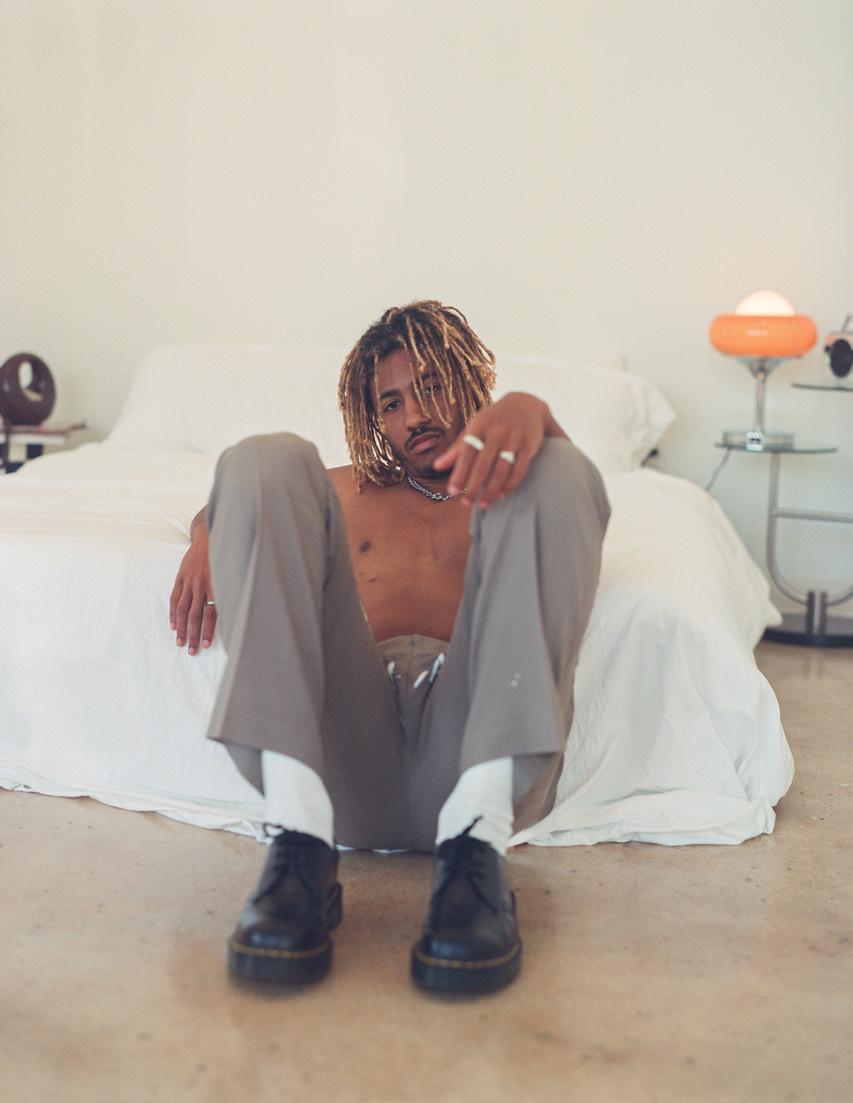
It’s not easy opening up, trying to connect the thoughts in your mind with the feelings in your heart. It’s a tall task that not only requires strength but also recognition and acceptance that you need to talk about it. This is something that men universally struggle with. As a man myself, I wish this conversation was an easier one to have. Whether it be your brother, dad, or even yourself, we all know a man with a stone-cold exterior that serves as a mask and shield for a soft and fragile interior. Luckily, I have the outlet and platform to have this conversation with anyone reading this. It’s a common occurrence where my emotions left me feeling estranged from the rest of the world, leaving me to ask myself—dude, is it just me? These are a few thoughts I share in an attempt to mend the stigma around them and put my fellow guys’ minds at ease that it’s not just them.
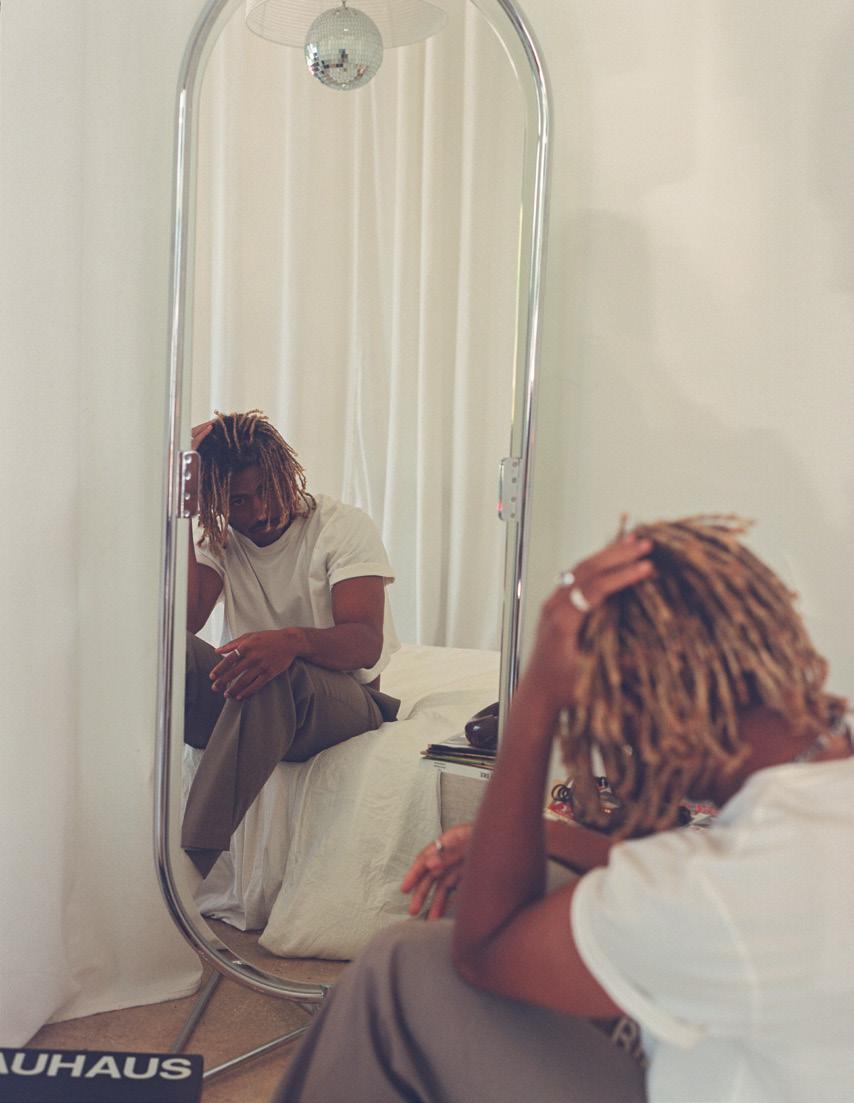 Written by JD Delcastillo
Written by JD Delcastillo
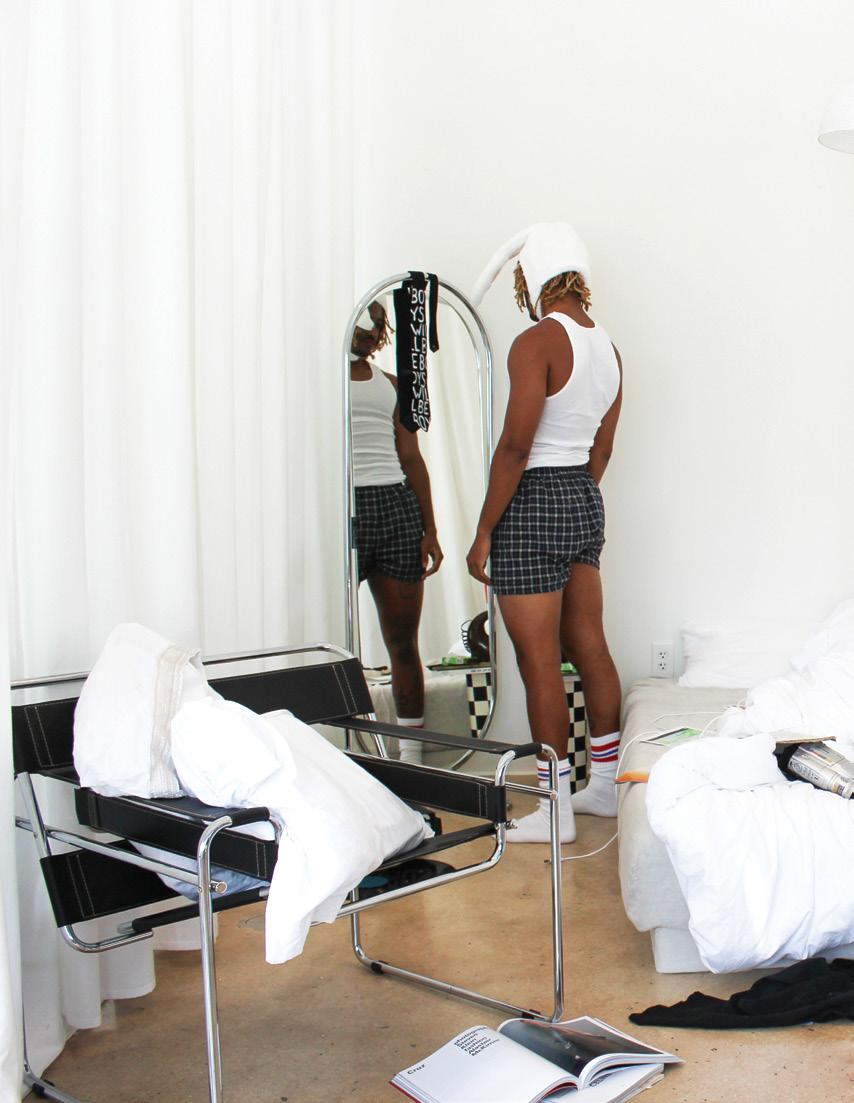
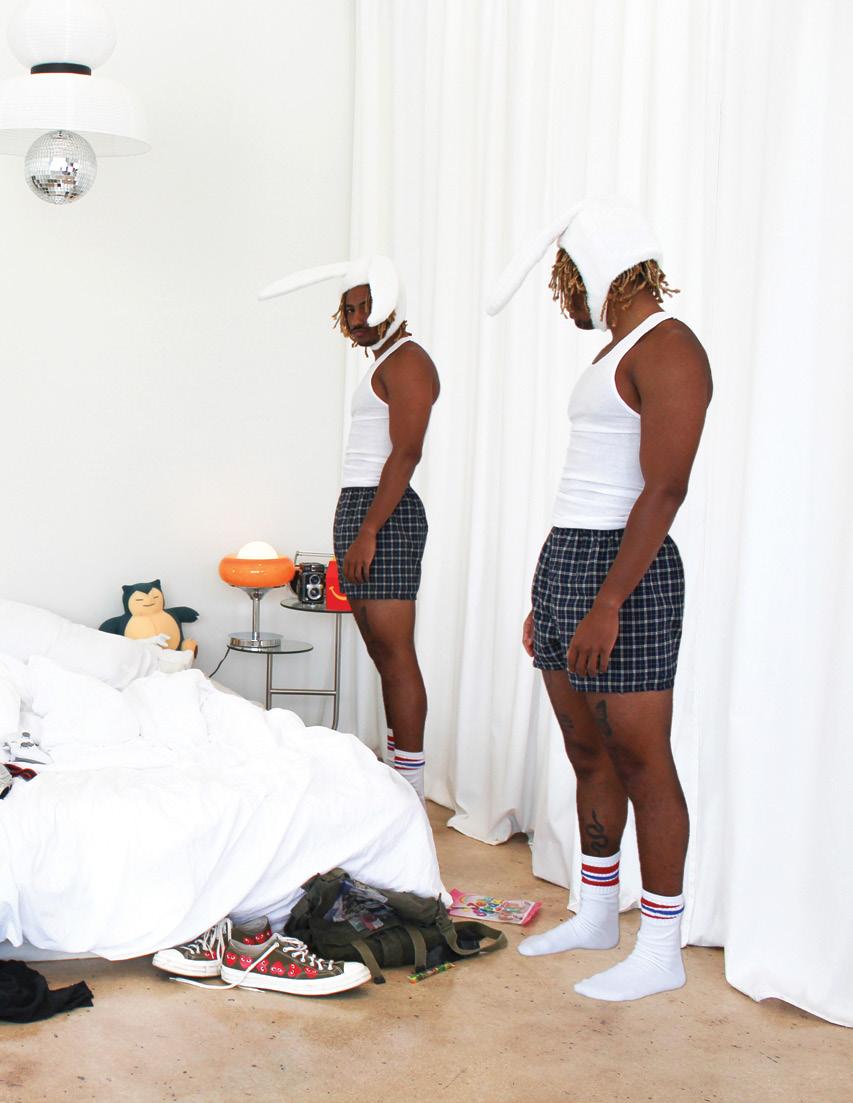
Confidence was something that developed in me as I got older. I wrote a goal my freshman year of high school that by the time I graduated, I would have the confidence to look in the mirror and like what I see. Here I am now, a sophomore in college, wishing I could go back in time and tell my younger self that it’s easier said than done. My biggest insecurity growing up was my physique, which I still struggle with. Growing up, I often beat myself up about being a short and scrawny kid. However, living in a society that gives clout to men for being tall and muscular, it wasn’t easy to stop. Characteristics like being six feet tall, having veiny muscles, or growing facial hair are all markers of masculinity. When you don’t have these traits, it can make you feel like less of a man. It’s like an imaginary benchmark that needs to be achieved to be socially perceived as a “man.” If you don’t meet the standard, then you’re left trying to compensate. However, even if you do make the benchmark and have these traits, it doesn’t mean you’re guaranteed confidence. Growing up in an era of body positivity and expressing individuality, it’s become so normalized to love and accept your body and express yourself without being scared. However, I’m still not convinced. Even when people tell me they love my confidence or compliment the way I look, I can’t help but still feel insecure. Instead of advocating for self-love and confidence-boosting, I think it’d be more effective if we were just more transparent. No one experiences security all the time, so we should be more willing to admit it.
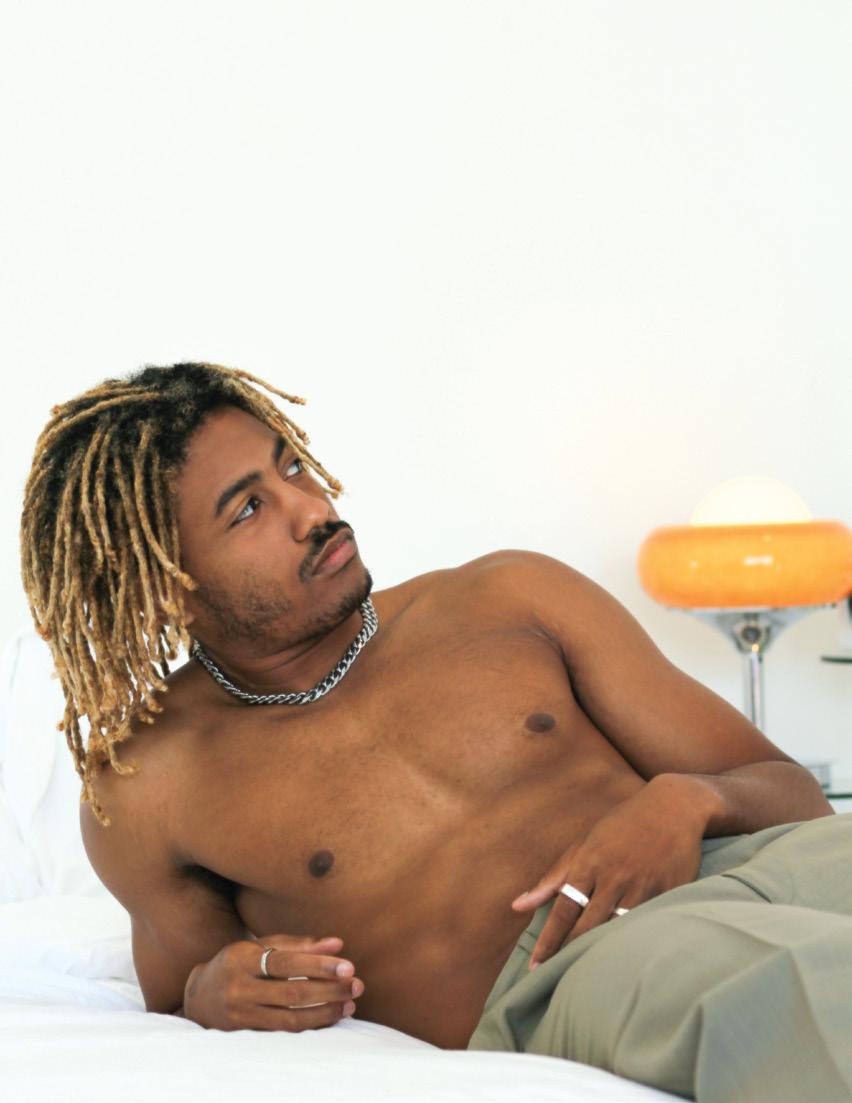
or do you get insecure about your body
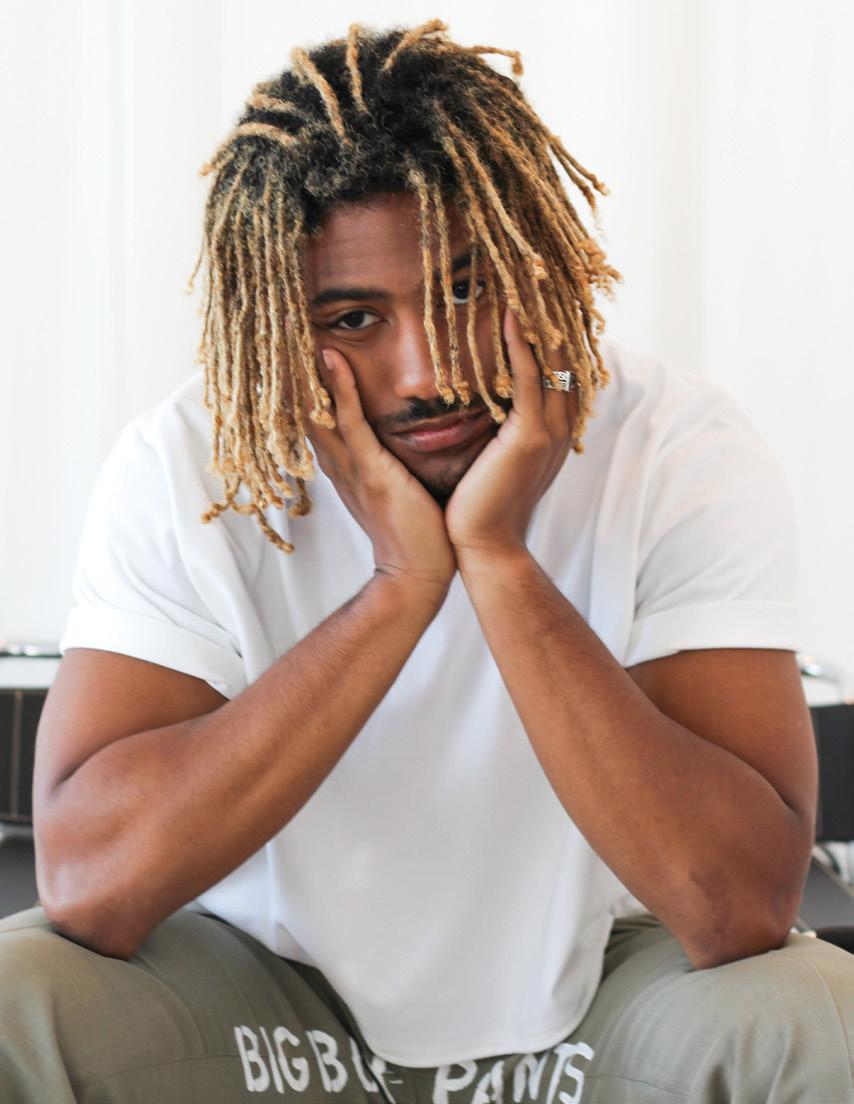
Femininity is seen as something for men to be ashamed of. Something to avoid at all costs. I’ve often felt put in a box of expressing myself because of what society has pushed onto men. In fashion, it’s been drilled in our heads that guys who have piercings or paint their fingernails are “gay” or “not real men.” Wearing bright colors or articles of clothing deemed “for women” puts a target on your back as a man. You avoid giving yourself that attention altogether and just wear what’s safe. Character traits like being brooding, nonchalant, or mysterious are often found to be most attractive in guys. Although it’s not wrong to be or feel this way, the way we perceive it is wrong. If a guy tries to step out of the norm by being more fluid in their expression or showing a little more enthusiasm in their demeanor, we try to label the type of man they are so that it’s easier for us to wrap our heads around. I don’t want to be a man with a soft side or a man who’s in touch with my feelings. I just want to be a man. As a guy, it’s hard to talk about this because of the subconscious pressure to maintain a strong look. Even if you don’t feel strong, you at least can’t look weak. Looking weak is a death sentence for the ego of a man. Not only this, but our fellow men enforce this train of thought through toxic masculinity and homophobia; it feels as if men create the box we put ourselves in. Because of this, insecurity gets pushed to the side, doesn’t get acknowledged, and doesn’t get fixed. The step towards progress with these issues begins by drawing a line in the sand and deciding what you want to represent. Do you want to be the guy that makes people feel comfortable being themselves or the guy that makes people feel like they need to pose? That all depends on if you’re more comfortable being yourself or posing.
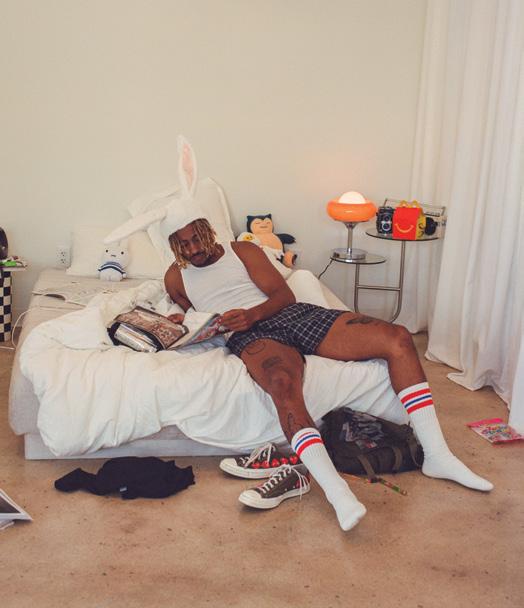
or are men not allowed to express themselves freely?
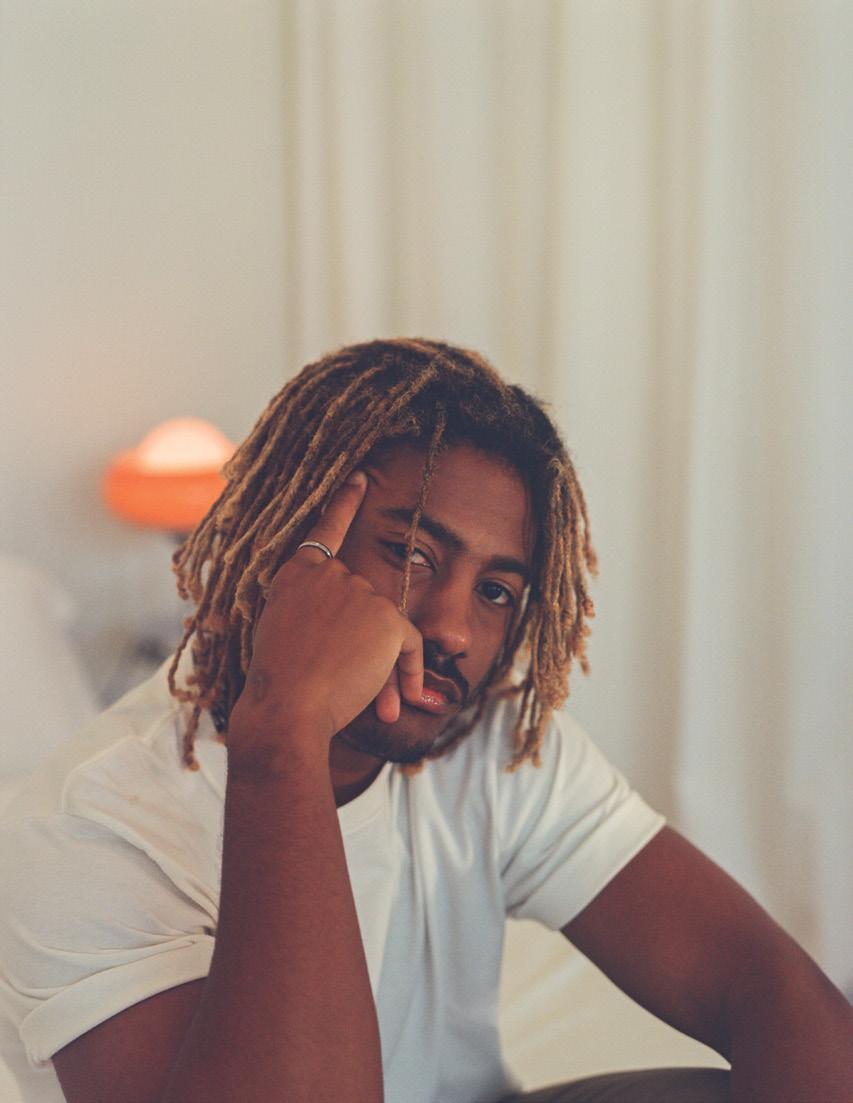
It’s a normalized behavior for men to suppress their emotions. From a young age, boys are sent harmful messages about how to handle and express their emotions. If you scrape your knee and have the very human reaction to cry, you better not. You need to “be a man” and walk it off. If something is stressing you out, you’ve just gotta put your big boy pants on and “suck it up” because men handle their business. If you want to tell the men close to you that you love and care for them, make sure to sprinkle in an insult or “no homo” so you don’t look soft. Expressing your emotions as a guy feels like something to be embarrassed about, like it’s something only reserved for women and children. This philosophy has been passed down by generations of fathers who lacked emotional intelligence and understanding of their own feelings. Now we reap the consequences by suffering in silence and being unable to muster up the courage to talk about how we feel. I’m so tired of having shallow conversations with male family and friends that only revolve around work, women, and sports. I want to have more honest conversations with the men in my life, to tell them that I’ve been struggling to stay positive or that my workload has been stressing me out. The fear of being judged or seen differently festers in the mind, and the only way
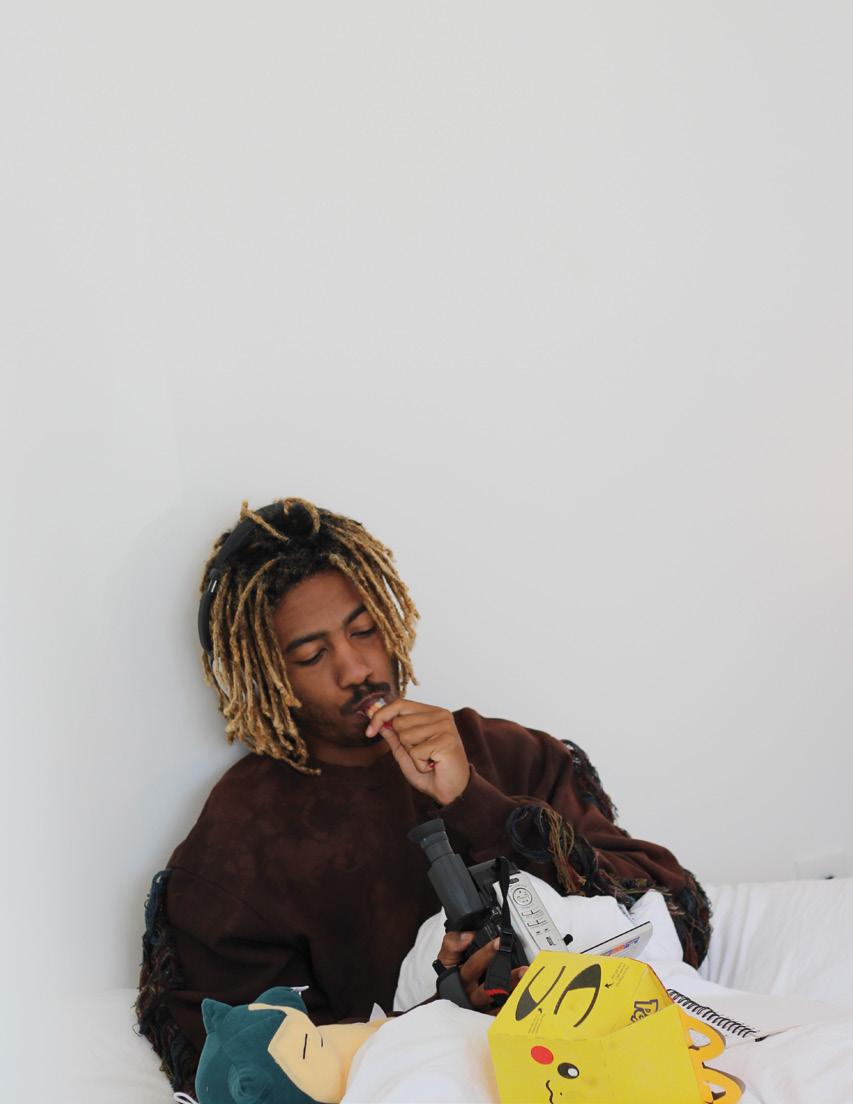
or do you wish men would open up more?
to curb it is by taking a leap of faith and being the one to break the ice. Initiate the conversation. Be the example that shows you can be both a man and transparent with your emotions, good or bad. It’s easier said than done. There are still relationships in my life where that wall has yet to come down. Still, as long as you learn and remember that wanting to be vulnerable doesn’t make you any less of a man, you can tear it down brick by brick.
These are just a few of the personal feelings I have that I felt were important to share in case any readers had doubts that it’s normal. Although some examples may not be relatable to some, I want to stress that honesty is important. It’s important, to be honest with yourself about your feelings and not pretend they don’t exist. This would allow for the next step of being honest with the people around you and expressing yourself honestly. Whether it be speaking up when you have a strong emotion or finally testing out a new style choice without fear of judgment, honesty is the only thing that will allow you to see that you aren’t the only boy in the world.
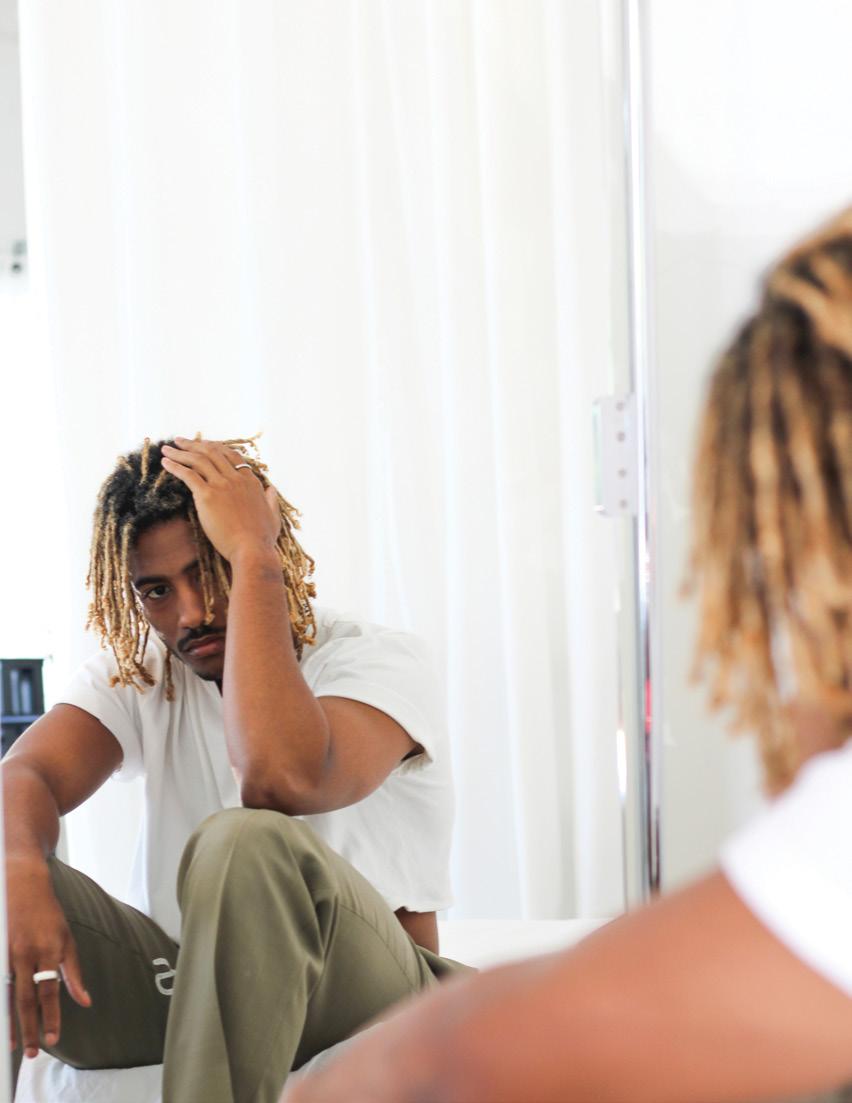
Accepting I have a crush on someone is absolutely devastating to me. When I don’t have one, I crave it. I love the idea of it. Whether it’s a work crush, someone in your social circle you see often, or even a gym crush with whom you might cross paths for an hour 4 to 5 times a week while doing your daily workout. The idea of being excited to see someone is so fun and wholesome. If the universe works the way you long for it to, you and your crush get to know each other! Getting what you want feels good, doesn’t it? You had your eye on someone, and now you’re besties which means they are going to catch on, fall in love with you, and you’ll live happily ever after! I mean, for someone else, it might work that way. I wish I could say the article you’re reading is a “success story” of some sort, but in a way, it is. A personal growth and acceptance journey, to put it into better words.
Once upon a time, not too long ago, the universe had me cross paths with someone I connected with very well. I felt something that hadn’t been there before, so you can imagine my panic when after craving a crush for so long, it finally arrived in my life again. Small PSA, though, this memoir isn’t about them. It’s about the personal growth I found and how I dealt with the consequences of my actions. Let’s continue.
I wasn’t even thinking, “Oh my god, I’m gonna be in a relationship with him.” I was just thinking, “‘Heard about this BDE,’ I need to get out there.” Feelings and BDE thoughts aside, I told myself that nothing would ever happen. Point blank, period. There was no point in even trying because why would he ever look my way? (Oh, MP, way to sell yourself short.) Instead of shooting my shot and dealing with the consequences that would follow, whether it be rejection or the person reciprocating what I felt, I decided to be absolutely insane and not say anything regarding my feelings. Now, why the hell would I do that? At the time, the reasoning behind my actions was simple and straightforward. I told myself that I would take myself out of the said equation to protect my feelings because I did not see anything happening. So why even bother? If I “knew” the feelings I had for them wouldn’t be reciprocated, why put me in that situation of hurt and rejection that would make me feel even worse about myself? I told myself I was better off with them never hearing it from me. I put my feelings to the side for
the sake of other people’s feelings! Abort mission ASAP. Clearly, I was down bad. Scary times.
Thinking back to this time of my life and how I decided to deal with my feelings is unusually conflicting for many reasons. However, I’ll mention two that stick out. On the one hand, I can see the “logical” side of my brain trying to protect my heart and what could come after. The fear of a close friend—possibly—denying me just seemed absolutely terrifying, so I avoided it. Simultaneously, I feel sad for the little girl inside me who didn’t feel worthy enough to express how she really felt.
Keeping my feelings bottled inside just felt like the most effective choice; even though my friends would try to shake me to my senses, I was blinded by self-sabotage and my insecurities. I was willing to see the reality, which was extremely crystal clear to everyone except me. Both of these are my truth. I’ve learned to understand that two things that are opposites can co-exist at the same time, feelings included. Our emotions don’t have to be black or white; I have come to understand why I saw self-sabotaging myself as me “protecting” myself. While also giving my inner child grace and letting it be known that if I am in a situation like this again, saying what I truly feel is not only something I deserve, but I owe it to myself.
Some time has passed, and when I look back to the person making these choices, I wish I could pull her aside and let her know that saying how you feel (most of the time) is worth it. Avoiding pain and rejection by pushing my feelings to the side helped absolutely no one, and it just made me more miserable at the end of the day. I really thought I was doing myself a favor, but in reality, I was hurting myself even more in the process.
With this memoir, I’m not saying I have all of the answers. But I can say that I’ve learned so much about myself. One lesson I gathered after this experience that I’ve been trying to put into practice is to stop underestimating myself and to give myself a chance, even when I think I don’t have a shot. Shooters gotta shoot.
Therapy has long been considered an almost shameful place where people with “problems” go to get help. Many people that go to therapy are embarrassed to admit that they go. On the flip side, an overwhelming number of people are proud that they don’t desperately need counseling. That being said, what constitutes a good candidate for therapy? As an aspiring psychologist, I can indeed say that everyone needs therapy. The act of receiving therapy is filled with a boatload of misconceptions. One misconception is that therapy is where you just sit and talk about your feelings. While therapy may include “talking about feelings,” it is vastly more in-depth than that. In addition to treating mental illnesses, a successful therapist allows you to accomplish numerous things during sessions:
- Managing relationships (romantic and non-romantic)
- Discovering the causes of your emotional distress
- Working to alleviate those causes
- Developing more emotional maturity
- Practicing how to handle people that lack emotional maturity
- Better understanding of how your mind and the minds of others function

Hopefully, you can agree that the topics on this list would benefit anyone to gain more knowledge. So why have we labeled people who go to therapy as highly mentally ill and distressed? Our culture teaches us that activities related to emotional self-reflection will make us weak. We are scared to be even a little bit emotionally vulnerable for a myriad of reasons. But whether or not we acknowledge our inner thoughts and feelings, they will still be there at the end of the day. For this reason, it makes more sense that choosing to go to therapy does not show weakness but strength. It takes courage to be willing to self-reflect, especially on unpleasant things, and It takes maturity to want to work on yourself and grow.
Another reason so many people aren’t willing to try therapy is how daunting the process of finding a therapist seems. It’s expensive and time-consuming. Because of this, people don’t want to go unless they feel it’s the last resort. Undoubtedly, quality mental health care is hard to find the less wealthy you are. Sadly, our healthcare system is money hungry. However, there are some easier ways of finding an affordable provider. First, there are, in fact, some therapists who accept health insurance. Just a quick google search of which therapists in your area accept your insurance will provide you with a list of options. My favorite resource is Zocdoc.com for its simplicity. From that, you can stop stressing about the costs and begin focusing on finding someone who is a good fit for you and your concerns. Each therapist should have an overview of their areas of specialty, the age groups they provide to, and other demographic topics. In addition to finding therapy from an independent source, most universities offer free counseling services. At FAU, CAPS is available to all students. The faculty is composed of psychologists and licensed mental health counselors there to answer any questions you may have. CAPS tend to offer short-term counseling to students, which means only a few sessions will be offered. If you find yourself wanting a more long-term therapist that provides visits weekly or biweekly, the CAPS faculty can help you find a provider elsewhere. Nonetheless, it is a great way to dip your toe into therapy and try it out with minimal commitment.
A few people I’ve talked with have expressed that they tried out therapy, which didn’t do much for them. This, unfortunately, leaves them to believe that therapy “doesn’t work.” Successful therapy is possible for everyone, but there are some things to remember. Seeing mental health therapists can be similar to the process of seeing medical doctors. If you’ve seen multiple doctors throughout your life, you know that some were more helpful than others, and some were more pleasant to interact with than others. It may have taken a few tries to find one you really liked. This process of finding a compatible provider is even more integral for therapists. This is because if they are not trained well and do not mesh well with your personality, making progress in sessions will be difficult. Sadly, providers who offer more affordable care are sometimes less qualified and skilled than those who cater to the more wealthy. As a result, finding quality care is sometimes more difficult than it should be. Another thing to keep in mind is that therapy is a collaborative effort. If you don’t attempt to put in the effort and actually try, results will not magically appear.
Looking past all of the negative stigmas, therapy can be an amazing tool for so many people who are missing out. Your mind and your emotions are worth investing time in. After all, your thoughts, feelings, and actions are what dictate your entire life. I can personally say that finding the right therapist has changed my life in so many positive ways. And despite what people may have said, therapy isn’t for “crazies.”


The highly successful app TikTok has taken the modern social media scene by storm. We all know of TikTok, and the vast majority of us scroll on it daily. The app plays a massive role in pop culture and constitutes what people think is cool and what is not. Music is one of the most prominent aspects of pop culture that is hugely impacted by TikTok.




Music can be made more popular, less popular, completely forgotten about, or even “canceled” just from TikTok. Although many fans have started to become irritated with the effect TikTok has on their favorite music, it has evolved into a breeding ground for all types of content creators. For musicians, it




has become the place where their songs go to either make it or break it.













When artists come out with new music, they’ll often use TikTok to make their debut or post little snippets and sneak peeks of their songs to garner attention and excitement from fans. When this technique works, it has the potential to change the artist’s life. Take a look at “Old Town Road” by Lil Nas X. In 2019, the song blew up as a TikTok sound. Lil Nas skyrocketed into fame and, three years later, became a millionaire artist. The TikTok algorithm

can be advantageous for artists if it works in their favor. In 2020, Lizzy McAlpine posted a TikTok video of her singing an original song about someone in her life-ruining the band the 1975 for her. The video now has around 2 million likes, and she’s making songs with the likes of John Mayer and Jacob Collier. These are just a few examples of how TikTok can jumpstart a musician’s career. If an artist continues to post videos of them playing, singing, or performing, the TikTok algorithm will work in their favor. This means that if you keep posting videos of you singing, they’ll continue to be shown to users who typically interact with similar content. TikTok users who love music videos are shown
more of the content they enjoy, and the artist gains more publicity. This is how artists like Lizzy McAlpine can reach a large audience on TikTok. It’s a win-win, right? Not always.
If the snippet of a song that the artist posts is not well received by TikTok users, then it can struggle to gain any attention at all. This is where the algorithm can fail. If enough users don’t interact with a post, it will cease to pop up in the algorithm after a while. In addition, popular TikTok users hold a lot of weight with what they say. So if they decide to not like the song or not use it as a sound for their video, then smaller users who piggyback

























continues, “They are doing this to basically every artist these days.” Musicians already have plenty on their plate on top of actually making music. This pressure to become TikTok content creators is an unrealistic expectation that could hold back many talented artists from ever reaching the following they deserve.
off of what the big users are doing will never find the music. In the end, the song or snippet is never seen or noticed by anyone on TikTok.





Additionally, as TikTok continues to gain popularity among the masses, artists are increasingly pressured to use the app to promote their music. This means that on top of making music, touring, or meeting deadlines from their labels, musicians now also have to learn how to become successful content creators. With every new TikTok user, the demand for musicians to start promoting their music on the app rises. In May 2022, Grammy-winning artist Halsey posted a video about the pressure of TikTok for marketing. She said, “I’ve been in this industry for 8 years, and I’ve sold over 165 million records, and my record company is saying that I can’t release it unless they can fake a viral moment on TikTok.” The added pressure put on musicians to become their promoters and content creators is negatively impacting the music industry. Halsey



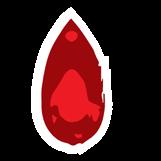






From a music fan’s perspective, on the other hand, TikTok’s impact on the music industry could have a much more negative influence. Here’s why: over the past few weeks, I have gathered opinions from many people on whether they think that TikTok has or is ruining music. The majority of the answers were a hard yes. TikTok does ruin music. A minority of answers were no, but a few people were simply indifferent on the subject. When asked why they answered the way they did, people were pretty passionate. Two of the most

I hate when I really like a song, and then it blows
common explanations for why someone said yes were: “I hate when I really like a song, and then it blows up on TikTok, and then it’s overplayed,” and “I hate when a song I’ve been listening to for like six years blows up on TikTok and then everyone thinks I got the song from TikTok.” Both of these are totally valid answers. I’m sure most of us have felt this way at some point since TikTok’s takeover. One of the worst things that can happen to your favorite song is it becoming overplayed to you. A song that once had a very special place in your heart now becomes just another skip on the playlist.










Now, let’s explore why hearing your favorite songs on TikTok is so repulsive. It stems from what our generation likes to call “gatekeeping.” For those who don’t know what gatekeeping is, if I hear a good song that I really like and refrain from showing anyone else and refuse to tell people what song it is, I’m gatekeeping the song. TikTok stealing your favorite songs right from under your belt and throwing them into the mainstream is frustrating. It is entirely understandable to want to gatekeep songs and keep them from blowing up and being overplayed. The reason we may feel this way is that if we go out there and put in the work to find new, good music, it feels a bit like a betrayal to have a song thrown into TikTok users’ faces disregarding how hard we worked to find that song on our own.
On top of that, there is also a pretty negative stigma surrounding “TikTok songs.” When a song becomes a “TikTok song,”







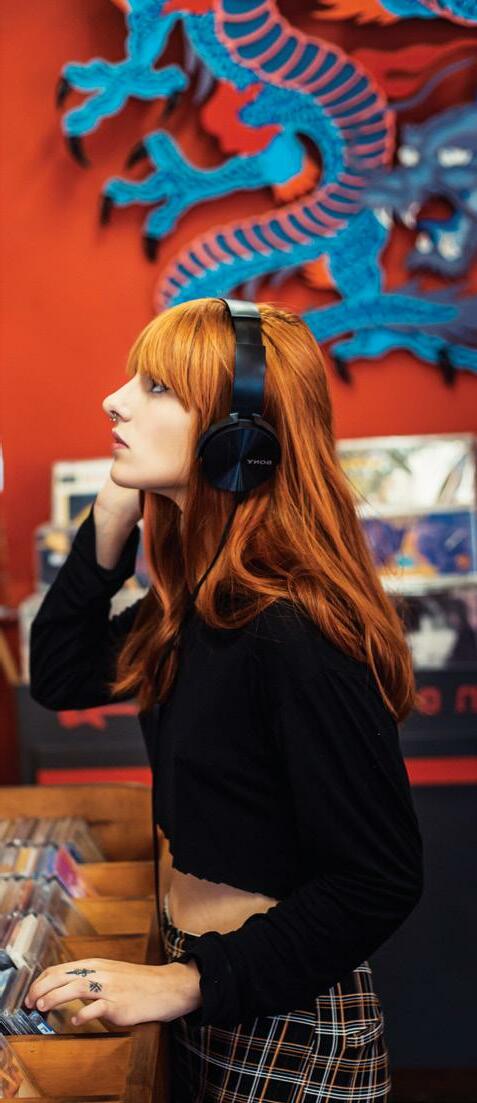


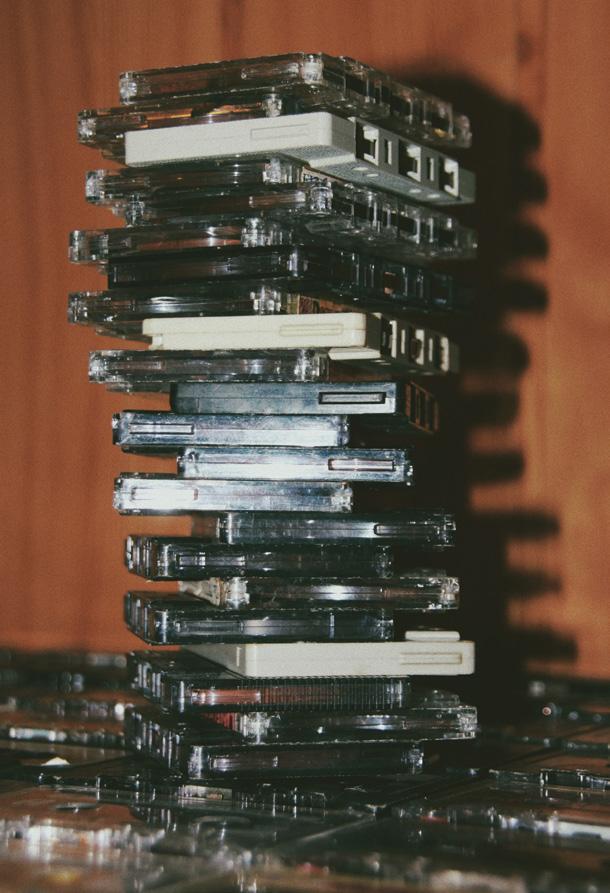







The more artists that TikTok gives a voice to, the more good music we, as fans, get.Photo Credit: lilzidesigns on Pexels
it is either sped up, slowed down, or has reverb, echo, or some other effect added, and it’s generally way overused by the TikTok masses. Basically, by the time your favorite song has become a “TikTok song,” it has been so overused and distorted from the original track that it becomes repulsive. In that aspect, TikTok can ruin music for us. Moreover, TikTok trends are getting worse and weirder as the days go by. Having your favorite song become part of some cringy trend can be especially irritating.


















As frustrating as TikTok can be for music fans who prefer to not have their favorite music ruined by a social media app, the effect TikTok has on the music industry cannot be overlooked. As previously mentioned, TikTok can shoot an artist into fame rather quickly. The more artists that TikTok gives a voice to, the more good music we, as fans, get, and the more the music industry thrives. Those of us who hate TikTok for ruining our favorite songs may benefit from receiving more beautiful music from the artists that are rising to fame through TikTok. Despite the agitation that may come from our songs
TikTok might not ruin music for everyone. Subjectively? TikTok might be one of the worst things to ever happen to music.
 Photo Credit: Dasha Horoshaya on Pexels
Art by Deana Dieujuste
Photo Credit: Dasha Horoshaya on Pexels
Art by Deana Dieujuste

 Written by Parmis Etezady
Written by Parmis Etezady
How would you feel if you saw the ghost of your favorite (dead) musician on stage? Seeing an artist in concert, hearing songs you’ve only ever heard on your phone (or another music player) come to life in an energetic, lively crowd, is often a breathtaking experience. Imagine a world in which your favorite musician is projected onto the stage, not with a gravity-defying fall from the ceiling or a rise from under the stage as a grand entrance. Instead, they are cast onto the stage as a collection of lights, producing a human-appearing figure who will near-perfectly imitate the artist from their voice to their body movements. They’ll even have small quirks that only a few may recognize. The figure becomes the artist and puts on a hell of a show doing it. Say hello to the virtual concert.


Virtual concerts occur in various forms. Multiple sources reveal that the musicianturned-hologram responsible for sparking the virtual concert revolution happened at the Coachella Festival in 2012. Tupac Shakur, one of the world’s most famous rappers, was brought back to the stage as a hologram 16 years after his death. The hologram sang and danced next to fellow rappers Dr. Dre and Snoop Dogg, shocking hundreds of thousands of people watching both in the crowd and on television.

Since this event, there has been a boom in dead musicians being “brought back to life.” Pioneers of garage rock Buddy Holly, the unforgettable Frank Zappa, “The Voice” Whitney Houston, the King of Pop, Michael Jackson, and heavy metal singer Ronnie James Dio are all musicians who have been regenerated for the entertainment of the masses.
The man responsible for directing the creation of the Tupac hologram, John Textor (CEO of Facebank Group), wants to take it one step further. He believes any celebrity, dead or alive, could have a “digital human” version of themselves. He claims that having an option for one’s virtual self to take their place at times could “give celebrities a freedom they didn’t have.”
The technology used to bring Tupac “back to life” is referred to as “Pepper’s Ghost,” according to Global News. An invention by Dr. John Pepper “involves projecting an image onto a piece of glass that is slightly angled, which then is reflected back onto the stage.” The Washington Post says the creators of this hologram spent 6 weeks with a body double who imitated Tupac’s moves. They were then digitally animated to look identical to the rapper when projected onto the stage.
Swedish supergroup ABBA has followed a similar venture. Instead of a traditional hologram, they have utilized motion capture technology to form digital versions of themselves. According to The Mirror, “the band performed in motion capture suits for five weeks while 160 cameras scanned their body movement and facial expressions.” These avatars then appeared on a pixel screen beside live musicians. Together, they performed 90-minutes of ABBA hits and songs from their most recent album, Voyage. 6 years in the making, an entire stadium was built at Queen Elizabeth Olympic Park in London for this stationary tour, which premiered on May 27 of 2022.
Another hologram concert, this time for the deceased Frank Zappa, featured a set-up of a center screen where Zappa’s hologram was shown with musical equipment and LED screens surrounding that area which ran all the way beneath the stage, according to the Washington Post. The hologram sang with Zappa’s live recorded voice and looked just like him from how it dressed to its movements on stage.

Proponents of the virtual concert cite a few reasons. For one, bringing back dead musicians for a new generation of music lovers to enjoy can be a beautiful thing, perhaps even a music history lesson. Younger people who adore old artists may feel overjoyed to be able to see them in concert one way or another. For example, a Frank Zappa tour featuring a screen that could show his hologram and create other eyecatching animations received much positive feedback. Audience members ranged from young kids to people of Zappa’s generation. In addition, the ABBAtar concert mentioned previously can be a great experience for a younger generation who could never have seen the group at their peak in the ‘70s.
It may be valuable to have the opportunity to appreciate and celebrate an artist’s accomplishments. It may even somewhat show what they would have looked and acted


like when they were alive through a virtual recreation of them at the defining era of their career. However, I can’t help but raise a ton of questions regarding the ethics of taking an entire human being’s identity, especially if they are no longer living, and profiting off it.
The most obvious point for me is that one is clearly crossing a boundary when resurrecting a musician in virtual form for the masses to view. It’s just weird. Once someone is dead, they are supposed to remain dead. I get wanting to stay connected to a musician you grew up with and have a certain intimacy with. Still, there’s just something about fawning over a dead musician’s hologram that rubs me the wrong way.
Of course, the thought of experiencing a performance from someone who has retired or is simply not alive anymore is an appealing image. However, what does this say about why one enjoys a certain artist’s music? If you really love an artist, you love them for the art that they create, not what they look like. It seems to me the lack of boundaries for appreciating a dead musician’s work without wanting to “resurrect” them in hologram form roots from the need for physical—just as much as mental—stimulation when listening to music.
This can destroy any ability to thoroughly enjoy the music itself rather than the artist’s face attached to it.


The consent necessary to use a person’s name, image, and in the case of holograms, their entire persona is evidently inaccessible when it comes to that of a deceased musician. While a team is often behind living musicians, helping make decisions regarding the copyright of themselves, the artist is ultimately in charge of how their identity is used. However, when the artist is taken out of that equation, it is up to their relatives, estate, or whoever possesses control over their name to make the appropriate decision.
While a deceased musician’s life is managed by an estate, there’s no guarantee that the estate will do its best to protect the musician’s legacy. The Washington Post brings up that when such large amounts of potential profits are on the line, how could estates look past the dollar signs and recognize that they could possibly cross a line by selling an artist’s entire name and image to a hologram-production company? Creating a virtual copy of a deceased musician to be displayed to thousands of people and generate thousands of dollars (if not more) seems a violation of that person’s right to rest in peace—no matter who gives the green light to do so.
IF YOU REALLY LOVE AN ARTIST, YOU LOVE THEM FOR THE ART THAT NOT WHAT THEY LOOK LIKE.
There’s absolutely nothing wrong with honoring someone’s life and accomplishments, as long as it’s from afar. The next time I want to see my favorite dead artist on stage, I’ll watch their original concert movie in my local theater.
Apart from dead musicians, living ones may also begin to utilize the virtual concert for themselves, as we’ve already seen with ABBA. But what could this mean for the connection between an artist and their fans?
There’s no doubt that many enjoy concerts due to the connection felt between themselves and the musician performing. It’s a beautiful thing to be noticed by the artist, or if not, even being in the same room as them can feel like a privilege. Many musicians are known for their unmatchable stage presence, whether they sound 100x cooler live or put on a show you wouldn’t be able to see with anybody else. The virtual concert, however, completely destroys this factor of the concert we know and love. How is one supposed to connect with a screen? A hologram can only do so much to imitate the artist. Sure, they can look and act like a musician and even perform stunts that the musician themselves wouldn’t be able to do, but holograms possess absolutely no human traits. No ability to speak openly and freely to an audience, to improvise, to be authentically themselves. When musicians begin utilizing holograms or other virtual effects instead of appearing at shows themselves, the bond between a fan and the artist is broken, nonexistent. Why would one pay hundreds of dollars to basically see a music video in person?
Another worry is that the virtual concert could potentially destroy fans’ expectations of being entertained. We already see this with the decreasing attention span among younger people due to social media. Though holograms do not possess any human attributes, the technology used to create them gives them access to a greater range of abilities to entertain.
The Frank Zappa virtual concert not only had Zappa in hologram form on-screen but also included various animations demonstrating the imagery he created with his songs. For instance, the Washington Post says Zappa transformed into dental floss at one point during one of his songs about owning a farm of floss. While this kind of vivid, interactive performance can be fun and a spectacle to see, I wonder what this could mean for the future of concerts. Are the possibilities of ways in which holograms could put on a show going to bore people of ordinary, real performers?
Take tribute concerts. If a dead musician can return to stage in holographic form, perhaps people won’t see any value in watching a tribute band anymore, costing these musicians their jobs.
This may sound like me reaching for reasons to hate virtual concerts, but many connected to the music industry feel the same way. According to Rolling Stone, Amy Winehouse’s ex-husband has called her hologram tour a “moneymaking gimmick.” Music journalist Simon Renolds also describes hologram tours of dead musicians as “ghost slavery.” In addition, Jeff Jampol, manager of the estates of 20th-century music icons such as the Ramones, Jim Morrison, and Janis Joplin, has compared these concerts to movies. He said, “There’s a black hole where this film is being projected,” that is, the projection of the hologram.
Clearly, there is much debate over whether or not more and more artists should begin to perform with the aid of digital effects or even completely trade in themselves for holograms. For now, I don’t see many holograms taking over concerts of my favorite musicians and groups. Let’s hope it stays that way.



Stle flash drive. How did we get here? How has a society who has never smoked a cigarette before managed to get addicted to something that was created to get you to stop smoking in the first place? If you developed a nicotine addiction in 2016, you are entitled to informational compensation. This is for you!
As someone who doesn’t have an addiction to vapes, I feel a slight superiority complex, but also a need to educate everyone on the epidemic. Vape sales started way before we thought, like in 2007. Their introduction to the market was a pivotal point in the decrease in cigarette use, thus shifting a smoker’s focus onto e-cigs. Between 2011 and 2015, the usage of vapes among middle and high schoolers has since increased by a whopping 900% Many of us have used vapes during the legendary year of 2016, whether it was in a bathroom stall or in the backseat of your friend’s car on the way to school.

If you were friends who once vaped, it was more than likely that you eventually would too. Most of us (as kids) weren’t as strong-minded as some who had the discipline to overcome peer pressure. The concept that “if you don’t vape, you’re not cool” corrupted young minds everywhere. Many have been hooked since the ripe age of 16. Although vaping is branded as healthier than smoking cigarettes, do we truly know how much healthier, or if it even is healthier than smoking cigs?
While it is slightly safer than smoking cigarettes, it does not mean it’s entirely safe either. Nicotine is extracted from tobacco, and heated along with artificial flavors and other chemicals we don’t really know about to become the “smoke” you inhale. You will be inhaling fewer chemicals than in your traditional cig, but without concrete knowledge of each chemical you’re putting into your body, we don’t know the harmful effects, short-term or long-term. As seen on TikTok, there are cases of people who have gotten lung injuries and even deaths associated with vaping. The cases are linked to people who have used black market, modified juices, and even those containing THC. However, this hasn’t stopped vape companies. They continue to abuse the system through marketing tactics that targeted people like us at an impressionable age.

their shift to these fruity flavors is what drew a lot of teens into the vape market. While you still had to be 21 to purchase a vape, people would go as far as to have “plugs” to get them vapes or they would get a fake ID to feed their addiction.
As stated earlier, people who have never smoked a cigarette have ended up with a vape addiction. This goes to show that influence is everything, whether you agree or not. As we all know, if anyone in your family is a smoker, you are more likely to smoke too. Addictive personalities are also a thing, and that also contributes to someone’s addiction to anything, not just vapes. This will make it harder for you to stop. It just so happened that Gen-Z went the opposite way into trying vapes before later trying cigs. It is an outlet for stress, and being a member of Gen-Z is a particularly stressful thing by itself. Put that on top of being a full-time student, working a job, raising a younger sibling, being the younger sibling, and other factors make it understandable that some of us need a little something to take the edge off.
Of course, there are people who find smoking hot. This is usually associated with cigs, but people do (somehow) find vaping attractive too. This is probably due to something called an oral fixation. According to psychology icon Sigmund Freud’s psychoanalysis, this means that you had an issue during your psychosexual stage that is still unresolved. This leads people with an oral fixation to have problems with drinking, eating, nail-biting, and you guessed it, smoking.
Wherever you stand on the issue of drugs or smoking in general, it’s hard to ignore the impact that vapes have had on our generation. Whether you plan on continuing to vape or quitting soon after reading this, it’s completely up to you. Life’s short, the risk is all yours.
Admit it—everybody wants to be perceived as some variation of the cool, interesting person in a group. Imagine a world where you don’t need to convince people that you’re cool through your posts on Instagram. I’ve noticed people who don’t have social media are different—they really are. They have a certain energy, as if they’re just enjoying life in its purest form. No temptation to document their every move, thought, or personal life for the public. Having social media is, in a way, your own version of a celebrity. A self-created one, if you will. No matter if you have 500 or 10K followers, many people tune in to the life you share. It’s almost as if you’ve formed your own paparazzi by documenting your intimate life for others. However, people without social media have no inclination to share.
Today, aesthetics dictate someone’s personality more than their unique traits themselves. However, people without social media are perceived as entirely different types of people. Many use social media platforms such as TikTok and Instagram to express their identities. On the surface, it’s not bad and can even be therapeutic to those who feel confined by their real-life surroundings. However, many people take a single style and limit the variety created throughout it. Take the more widely recognized “cottagecore” aesthetic. It consists of pale colors, lace, domestic bliss, and a rustic vibe and environment. Picture the ideal cottagecore Instagram influencer with all of these characteristics. Imagine them posting a photo wearing all black, standing in a parking lot, and smoking a cigarette. You wouldn’t think that is who they are at all, right? But how do you know? Because their Instagram account
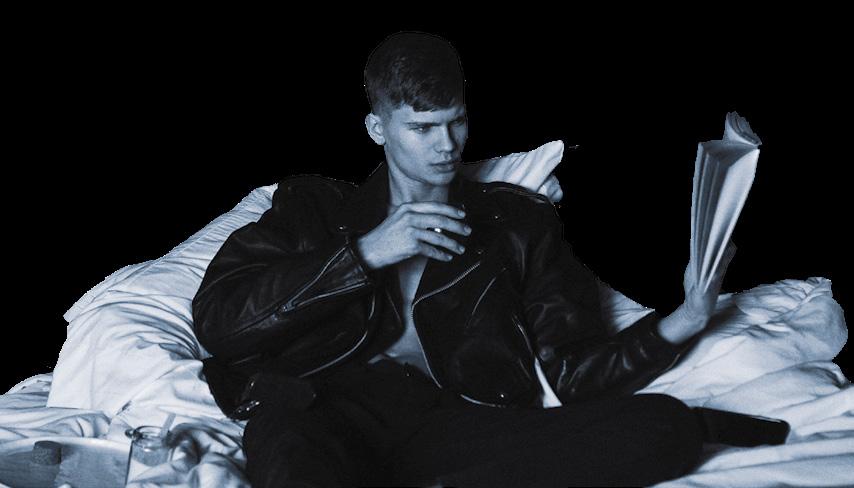
limits their expression to simply what they became famous for, making their persona one-sided and bland. In contrast, people without social media have no reason to adhere to a specific lifestyle to please the social algorithm. They simply present themselves how they choose to and lack the extreme conflict with self-confidence and acceptance that social media presents to its users.
I feel like it’s cliche to say, but social media really does damage relationships in some ways. In my personal experience, the constant need to report activities with others makes it so difficult to tell if your relationship with someone is genuine. Of course, you can just talk it out, but would you ever really know the truth? When being friends with someone who doesn’t have any social media, I feel much more at ease. There’s no pressure to snap a pic, tag them, and make sure your other friends see. You just live. You enjoy the moment. I imagine not having social media almost lifts a weight off of your shoulders.
This isn’t to say social platforms don’t have their benefits. Of course, it’s fun to make friends online with people who share your interests, and you wouldn’t meet them in real life. A lot of the time, online connections can be great. You can have friends to meet up with or stay with when you travel and people to show you around and introduce you to even more new, cool people. But not having social media pushes one to form relationships with people they wouldn’t usually consider bonding with, and I believe there’s beauty in that.
Personally, the people I’ve met without any social media are genuinely some of the coolest—calm, collected, and just present in time. It sucks to not have any insight into one’s life, as social media usually takes care of that. But then I think to myself, why not just ask? Learning about people from themselves is fun. Looking through someone’s insta? Also fun. But not as fun as having a genuine conversation with someone, sharing interests, and feeling that connection. There’s just something about someone who isn’t completely absorbed in posting about themselves online. Of course, I am guilty of doing so. Don’t take me as a hypocrite. I just like to think that people who don’t interact with others dominantly on social media have a greater capacity to form meaningful relationships.
When I talk to people without social media addictions, their body language shows me that they naturally have more of an ability to listen, be patient, and care. One of the biggest problems I have with social media is that using the apps as a filler
for free time causes many problems in various aspects of life. What do people without socials do? They find activities to fill their time with. Instead of mindlessly scrolling through dozens of posts that don’t benefit them in any way, people without socials find things to do that improve the condition of their present well-being. Whether it’s adopting a hobby, going out to a new place, or simply completing tasks that wouldn’t have crossed their mind if distracted by social media apps, they utilize their hours with things that are good for them—small or large.
People without social media just hit different. For example, a celebrity without any accounts on Twitter, Insta, or TikTok is considered cool for not feeling the need to prove who they are online. Take Bella Hadid’s boyfriend, Marc Kalman, as an example. The two have kept their relationship pretty lowkey since last year. Kalman works in the fashion and art industries, collaborating with artists such as Travis Scott and working with high-class brands. But you wouldn’t know it unless you looked up his name on Google. Why not? He has absolutely no presence on social media. Mysterious, right? That’s the exact effect anyone lacking a persona on social media apps has on the average person.
Remember when I said constantly sharing your life on social media almost makes you your own paparazzi? Celebs clearly don’t need paparazzi more than they already have to deal with it. Those who avoid socials keep everything even more private, leaving the rest of the world to wonder what happens in their lives. Not having a social platform benefits the celebrity’s private life. It boosts their image of being a cool, lowkey person who doesn’t need to virtually connect with fans to have an audience.
We have social media because we feel the need to join in on online conversations. Those with addictions—and it’s not shameful to have one—feel as though they miss out if they don’t see other peoples’ posts or don’t share their own. However, someone with no social media proves to others that they simply don’t care enough to become involved in a digital sphere; their present reality is enough for them. And there’s a coolness in that. There’s a cool factor in not doing what everybody else is doing, in going your separate way. These people likely have enough authentic relationships with people in person that they don’t need to form connections online. Again, there’s nothing wrong with online connections. I think they can be so much fun! Personally, I won’t be leaving social media anytime soon. But for some people, that’s just not their way of living, and I have to say I appreciate it.
